#It’s so difficult to find references for Gabriel...
Explore tagged Tumblr posts
Text
Crooked sketch to relax x'>
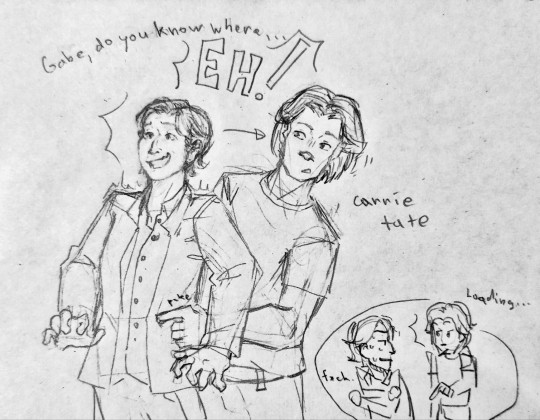
#It’s so difficult to find references for Gabriel...#I never thought#that it would be so difficult to find a photo#where this man doesn’t just grin slyly but laughs lol#so forgive me that it’s so crooked#talk#art#gabriel spn#sam winchester#spn#supernatural#tickle art
135 notes
·
View notes
Text
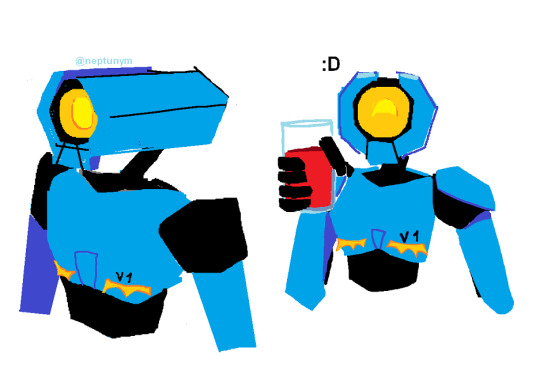
more mouse doodles bc who needs tablets
#ultrakill#v1#v1 ultrakill#ultrakill fanart#mspaint#ms paint#mmmmmachine#im procrastinating on beating the aesthetic of hate#gabriel keeps killing me in like two hits bc i just refuse to rework my strategy#oh well#id included#im half tempted to just rip its model from the game and put it in blender so i can make my own references#bc finding something that computes with my brain is so difficult for no reason#arttag#galadraws
59 notes
·
View notes
Text
Ways of Grieving
Warning: Canon non-compliance, Major Character Death, Suicide.
_
When Nathalie finally passed, after years of battling the damage the Peacock had done to her body, Adrien felt nothing.
He hadn't cried when her hand, entwined with his, had lost all its strength, the muscles slack. Like a dead fish, he'd thought. Or Lila trying to show real human emotion.
When the light went out of her eyes, he'd felt nothing. She was there, and then she was not. The body was Nathalie, and now it was not. It was a body. A body that had once been there closest thing he'd had to a parent for seven years, and now it was just. Meat.
That's all his father had ever treated her as anyway. Now she matched.
What a horrible thing to think.
So why couldn't he stop thinking it?
The hospital had been cold when he walked in. It may have still been cold. He couldn't tell. He couldn't feel anything, except, maybe, guilt. Guilt that he couldn't offer any tears to the woman who'd raised him. Guilt that he had nothing for her in his chest except an empty, dead feeling.
Marinette, of course, was inconsolable. She'd been sure that the cure was in the Grimoire somewhere, but translating had been long and difficult work—it had been written over hundreds of years, with linguistic drift and different cyphers building up into a monstrous decoding project that she'd only gotten halfway through. She'd prioritized any page that seemed to reference the Peacock, or healing, or Miraculous damage, but she hadn't found an answer and she'd run out of time.
She sobbed into his chest, into his shoulder, and he thought of how odd it was that the girl he loved, who'd barely known Nathalie as anything other than an obstacle between herself and him and then as a weak and dying woman, would need to be comforted by him over the passing of someone she'd barely known, while he couldn't even bring himself to feel... much of anything. No relief that she was free of her suffering. No sense of loss. Perversely, he would have preferred joy to this... nothing.
He felt the way he did when Chloé used to kiss him, or when he'd modeled alongside Lila—like he wasn't properly in his body. Like all the chemicals and meat and physical reactions in his neurons, his muscles, his skin belonged to someone else, and he was just watching from next to himself. Watching a statue.
_
He went through the next two days the same. He didn't bother to shower, or to change his clothes, not even to go to bed. He barely ate, because he couldn't find it in himself to feel hungry. He didn't expect Nathalie around every corner, the way some people described—this was his apartment, not the mansion, and she'd never been here. She'd moved to the hospital full-time before he'd moved out. So there was no expectation of her arrival.
Marinette called him seven times and texted him thirty-six. He let the phone ring. Didn't read the texts. He was barely aware of time passing, of the days blending into nights and the nights blending into days. He slept when he slept. He awoke when he awoke. Things were what they were.
He wasn't sure how much sleep he'd had when the splitting sound of his phone in his ear had wrenched him out of dead and dreamless sleep. Blearily, he looked at caller ID, and realized it wasn't Marinette calling him. La Santé, the contact name said. His father's prison.
The public contact was apologetic, almost pleading for some kind of forgiveness. He couldn't understand why, until she explained the situation.
Gabriel had heard about Nathalie, she told him. The wardens found him the next morning hanging from the top bunk with his own bedsheets expertly tied around his broken neck.
She'd been so broken when she told him. There'd been a note, she said. He could come down to read it whenever he was ready.
Adrien thanked her with a hollow voice, let her know he wasn't sure when he'd be able to come by, and then hung up the phone.
Then, lying on his bed and staring up at the Marinette-pink ceiling, he felt something inside him shatter.
Pain lanced through his entire body, burning and tight and angry. He turned to the side, tucked his knees into his chest, and sobbed. Tears came to his eyes, slowly at first, then in a river that wouldn't stop. Snot flowed from his nose as freely as the saltwater from his eyes. He held himself together as best he could with his arms, his shivering form feeling like someone had scooped something out of him like an ice cream bucket. Like his ribs, his heart, had been careless torn from his chest and he'd been left open and raw and bleeding.
He couldn't stop crying. He couldn't stop the wave of despair that washed over him, the black tide drowning his thoughts and leaving him unable to breathe between sobs.
Why? Why could he cry for Gabriel, a man who had never loved him and who he'd given up on loving years ago, and not Nathalie? Not the woman who'd shown him care when he'd given up on expecting it? Why did fucking Gabriel get his tears? Bastard fuck of a father, the man who'd murdered him again and again and again, even after finding out it was his own son he was killing. The man who'd nearly ruined Marinette's life with his obsession and spite—left her still unable to enter a room without marking the exits and any objects she could use as Rube-Goldberg weapons. Left him with this deep and aching sense that he the most Adrien could do to be loved was die.
He hated him so much. Not just for what he'd stolen from Adrien, from Marinette, from Nathalie, but because he'd taken the grief that had belonged to her. The woman who'd been his stepmother in all but name, versus the man who'd only ever been his father in name. Why could he grieve the one but not the other?
It was good that he was dead. It was good that he was gone. So why did Adrien feel so empty over it?
_
He didn't tell Marinette about it. It consumed his waking days—how thinking about Nathalie emptied him out, while thinking about his father filled him with grief and rage. He begged off patrols, rejected her calls. He was a monster, for grieving wrong. For grieving a man who'd torn him apart. Literally, on some occasions.
Still, Marinette had his apartment key, and she couldn't be avoided forever.
He wasn't sure how many days had passed since Nathalie slipped away in his hand, how many days had passed since his fucking bastard of a father had shoved one last burden onto him and then escaped the consequences forever. Still, his stomach dropped when he heard Marinette's key turn in the front door.
"Kitty?" she called. "Are you okay?"
"Kid hasn't moved in a week," he heard Plagg say from the front hallway. "I'm not even sure he knows I'm talking. He won't respond to anything. He's not even eating."
"Where is he?" Marinette asked, her voice trembling.
"Bed."
The door to his bedroom creaked open. "Kitty?"
He didn't want to see her. He buried his head under the pillow and pretended she wasn't there.
She sat down on the side of his bed, the mattress deforming under her weight. "Adrien, please. I'm here." Her hand tried to press on his shoulder, to massage, and he twisted away from her touch.
"Adrien..." she murmured, her voice so soft and full of concern and he couldn't stand it, he couldn't fucking—he couldn't—
"I couldn't fucking cry for her," he snaps, still facing the wall away from her. "I felt—I felt—nothing. And then—and then—he—and I just..."
He turns over to look at her through blurry eyes. "Why does he get my tears when I can't—I can't—I can't feel anything for her?"
Marinette covers her mouth in shock. "Adrien?"
"When he died, I just... I broke, okay? I—everything hit me at once, and I couldn't stop crying and thinking about him, and Nathalie was just—she slipped out of the back of my mind, and I couldn't—I couldn't—" He was sobbing now, but nothing was coming out. He'd had so little to drink in the last... week? Plagg had said week.
Marinette took his hand, and he wanted to jerk away, but he forced himself still.
"Of course you did," she whispered. "Nathalie... the grief is too big for you to look at."
What?
"Adrien, you may think you're not grieving her at all, but I—I saw the way you broke in that hospital room. I—your model smile came back. The fake one. I haven't—I haven't seen that in years." Marinette brushes her hair away from her forehead with her free hand, eyes closed, lashes wet. "You stopped responding to people, you stopped—it was like you were there, but you were gone."
"And—and why am I crying for him?"
"Because—" Marinette seems unsure. "I don't know. Maybe because... you're grieving what could have been? You're grieving the man you wished he would be?"
Maybe. Maybe she had a point.
"Maybe because you're angry. Angry at him for taking the moment that should be about Nathalie and making it about himself. Angry that you'll never get him to understand how much he hurt you."
Adrien curled up further. She was right. She was always right. God, he wanted to dig up his father's grave and scream into the man's face.
"Adrien, I cried when I heard. And it wasn't for you."
His brain slammed to a halt. What? She'd—why had she...?
"That man made our lives a living hell for five years. And I'd built... so much of myself around opposing him, around being everything he wasn't, around hating him and fighting him, and suddenly he was just... gone?" She squeezed his hand. "You loved him. You hated him. You can still grieve people you hate. And hating him... doesn't mean you didn't still..." She sighed. "There's nothing wrong with still loving him. There's nothing wrong with grieving him."
"And crying...?"
"There's no wrong way to grieve," she said. "And it seems like it's... smaller. So take it one step at a time."
"Hm?" he said, confused.
"Grieve them in whatever order you need to," Marinette said, holding his hand to her chest. Right over her heart. "Let it happen how it happens. I'm right here."
The last piece of Adrien that was holding together snapped, and he crawled into her lap and finally let himself collapse.
#miraculous ladybug#miraculous#marinette dupain cheng#adrien agreste#original content#adrienette#adrinette#my fic#gabriel agreste#nathalie sancoeur#gabriel agreste's a+ parenting#death#major character death#grief#suicide#depression
44 notes
·
View notes
Text
A narrative clothesline
The following ramble isn't what I think is *likely* to happen in S3; it's more of a narrative clothesline that my brain has constructed almost completely independently of any conscious effort on my part, influenced by various metas and my own and others' speculation, and it serves as a thing onto which I can peg images and vignettes and headcanons that I really like. (My brain is a very interesting place and tends to make stuff up without me noticing...) This gets VERY LONG, so have a bookmark handy!
Wackiness under the cut! Also torture, psychological abuse, violence, PTSD -- tread carefully.
Now, on with the motley!
***
Long, long before any sort of beginning, eons (if such temporal vocabulary makes sense here, given that time hasn't been invented yet) before a certain flame-haired starmaker realised he needed a hand with his blueprints, the Archangels Raphael and Azrael become suspicious of the Metatron and his interpretation of the Great Plan, becoming the first two angels *ever* to question when they start probing his motives. The Metatron takes great exception to this, and by the time he's finished with them, there isn't enough left to make two whole angels. Scenting a possibility for experimentation, he stitches these remnants together into a single new angel of lesser rank, who he hopes will be more compliant and biddable.
...Okay, you can stop laughing now.
[Main Titles]
See, in modern times (a couple of months or so after Gabriel's shock resignation), the Supreme Archangel "Raphael" -- resplendent in elaborately draped robes of Heavenly white (difficult to run or defend oneself in) with wide bands of elaborate gold decoration at the wrists and high collar (which, looked at another way, resemble symbolic chains) over bare feet (terribly angelic, but a classic way to humiliate captives while making it harder for them to flee). The overall effect is of regal, ethereal magnificence and dignity -- unless you know the full context, in which case the clearest impression is one of mockery, contempt and "We own you -- mind, body and soul -- and can do what we like to you with absolute impunity. Think about that before you consider rebelling."
The facial features and shock of fluffy white hair are heartbreakingly familiar, the utterly blank facial expression and stiff, upright demeanour less so. His voice, when he speaks, is many octaves below the 'soft bookseller' tones one might expect. Also unusual is "Raphael"'s tendency, when unobserved, to stare into space while touching his mouth or fiddling with a mysterious silvery trinket; otherwise, he goes about his duties in the manner expected of an Archangel, knowing only what he needs to know to prepare for the Second Coming. Which means that when his predecessor in post and a former Duke of Hell sneak in via an unregarded rear entrance to plant bugs, "Raphael" doesn't notice or react to them at all!
Cut to Crowley sprawling on a bench in some rural area, brooding deeply and looking portentously undisturbable (his native optimism is taking a while to rev up after the recent emotional whammies). When someone unexpectedly stands between him and the sun, he starts to snarl at them, only to be interrupted by a cheery, "Party name of Crowley?" Crowley leaps up, startled, accusatory and hostile, but the International Express delivery guy hastily clarifies, "It's ok, sir, just a mundane delivery -- but the lady was very specific about where to find you." Crowley (recognising the style) simmers down enough to take the letter with some grumbled thanks, opens it and is stopped in his grouchy tracks by a reference to the body swap that could *only* come from someone deeply familiar with the Nice & Accurate Prophecies.
Attention thoroughly caught, he scans the rest of the letter, swears in ancient Sumerian and bolts for the Bentley, nearly colliding with four startled, nervous-looking angels in militaristic garb. Crowley reaches for his crank handle, but then notices odd details -- the large wooden box one of them is holding, the dishevelled state of the uniforms, the insignia, all four of the angels bowing to him with deep and genuine respect... "Hang on, you lot are from Aziraphale's old platoon, aren't you? What the blazes are you doing here?"
The angel holding the box stutters in fright for a few seconds, but manages to get out, "Th-The L-T... He's...not exactly dead, but we're not sure what the Metatron did to him. W-whatever it was, it was bad, so we, that is the platoon, got together and drew lots and we gathered all the L-T's personal effects we could find and deserted..." The angel proffers the box to Crowley, while one of the less-intimidated angels explains, "You're effectively the L-T's next of kin, the whole platoon saw him desert in favour of you during the last go at Armageddon, and we've decided we respect him and you more than we fear the Metatron."
Crowley is very impressed, and says so. "But what about the rest of you?"
"They're back Upstairs, keeping watch over the L-T in case of untoward developments."
"Rrrrright... Oooooookayyy... I take it, then, that you're willing to take orders from me until the Second Coming is foiled?" The deserters nod. "Right, in that case -- you know where the Bookshop is? Meet me there, but don't teleport directly; it's too easily traced." The deserters salute crisply and set off flying, while Crowley climbs into the Bentley and takes a moment to investigate the box. It does indeed contain Aziraphale's clothes and personal effects, and he spends a couple of minutes just holding the familiar old waistcoat against his cheek and inhaling its scent, before starting the engine and veering off at speed. He's so awash with emotion that the one item missing from the box doesn't immediately register...
Back in Soho, things are fairly slow in Give Me Coffee Or Give Me Death, so Nina's got time to chat with the customers. They're interrupted by the sound of a recklessly driven 1933 Bentley blaring Velvet Underground dopplering up the street in their direction. The Bentley turns within its own length and slips neatly into position outside the Bookshop, before disgorging a goth-punk redhead and a snatch of vocals -- "RUN RUN RUN RUN RUUUUN". The redhead slams the door, hefts a large box under his arm, yells, "FUCK THA SECOND COMING!!!!! HAHAHA!!" skyward (with accompanying hand gestures) and swaggers into the Bookshop as if he owns the place. Following a stunned silence, the customers ask, "Who...was that?" Nina replies, "Oh, that's Mr Crowley. He's one of our local, uh, characters. Basically co-owns that bookshop with his husband."
Inside the Bookshop, Crowley calls, "Oi, Muriel! You there?" and is answered by a nervous squeak from a pile of books on the mezzanine. He leaves the box by the till, bounces up there and glances from the haphazardly stacked volumes to the extremely worried scrivener hiding behind them. Plopping comfortably on the floor, he asks, "Lord of the Rings, eh? [waves the book in question] How're you getting on with Tolkien?"
Caught a little off-guard by Crowley's sudden appearance and friendly demeanour, Muriel replies, "Um.. I-I-I... It's good, but I found it a bit overwhelming. I-I liked the bit about the elves only guarding their forest, not ruling or owning it, though."
"Yeaaah, Tolkien's style can be a bit much if you're not used to it. He was a pretty interesting guy, though, great linguist. You'd've liked him. Anything else grab your interest?"
Muriel brightens up a little. "Yeah! The Discworld stuff is great! There's so much there to think about that I hadn't even considered before! There was this bit in one of the later ones, about sin being treating people as things, and um, I..." Crowley gestures for them to continue. "Well, it got me thinking about how the Metatron was before, with the stuff in the trial we saw, and just telling Mr Fell that I was going to be in charge here without giving him a say, which is a big overreach and a kind of theft, and I think the wards are damaged but I can't fix them myself because that would really be theft, and I think the building's a bit sapient and resents my presence, and I haven't opened or anything because I don't know how bookshops work and don't have Mr Fell's permission to sell things, and I... I don't want the Second Coming to happen because there are so many books I haven't read yet!!!"
Crowley makes a 'simmer down' gesture. "Okay. Taking it from the top: Thinking is always good, never stop doing it. You're absolutely right about Heaven and the Metatron sinning by treating people as things. We will need Aziraphale here to reset the wards, but there're ways to shore them up without committing metaphysical theft. This building may well be a bit sapient, like my car, because Aziraphale's put so much time and love into it. If you're truly against the Second Coming, then you have my permission to be here. Aziraphale actively tries to avoid opening or making sales anyway, so you're doing fine on that front. Okay?"
He's about to say more, but is interrupted by a sound from outside that could be described as "a six-foot-tall cat played by John Hamm negotiating the expulsion of a particularly obstinate hairball while in extreme emotional distress".
Of course, what is actually is, is a certain renegade Supreme Archangel who's seen something that's upset him to the point of dry heaving and loud emotional meltdown: "THEY KILLED HIM!!! THEY WIPED HIM LIKE THEY WERE GOING TO DO TO ME AND THEY PUT HIM IN MY OLD JOB AND THAT SOMEHOW MAKES IT WORSE!!!" Beelzebub tries to calm him down, and they eventually succeed in directing Gabriel's attention to the Bentley, the Bookshop and the startled redhead leaning out of the doors.
It's a mark of the seriousness of the situation that Crowley lets them into the Bookshop without a word of snark. He directs them to the sofa, pours himself into the chair opposite and stares at them with a quizzically raised eyebrow. "Why'd you come back?"
Gabriel is still gathering himself, so Beez answers, "We got talking... We both have a lot to atone for, and Gabriel wanted to repay you and Aziraphale for your kindness better than he could have done when everything blew up before [Gabriel nods emphatically]. Then we reasoned that the destruction of everything in Armageddon round two would catch us wherever we were, and we'd be just as dead as if we'd been executed for returning..."
"...so we figured, what the heck, let's make it worthwhile!" Gabriel takes a slightly shaky breath. "So we came back to help you and Aziraphale mess up this Apocalypse, and we snuck into Heaven to plant spy flys [Beez smirks while Crowley does an impressed double-take], but then we saw..."
"Yeah, I heard you." Crowley pulls out the letter from earlier and hands it over. "Aziraphale's not dead, he's way too stubborn for that. We have more allies than you think, but we've got to plan carefully or we're stuffed. Speaking of allies..." He launches himself upright and swaggers to the door, where the deserters he met earlier have just landed. In something of a Regimental-Sergeant-Major mode, he says, "Right, you lot, this Bookshop is pretty much HQ for now, but the wards are damaged and we can't properly repair them without Aziraphale. Set up a guard duty rota covering all possible entrances and exits, at the double, but keep it discreet. Got that?" That done, he gently dragoons Muriel into helping him get his plants out of the Bentley and into his and Aziraphale's bedroom. When he's alone once more, he spends a few moments puttering around, sorting out his angel's clothes from the box (noting the missing bow tie with a twinge of sadness) and lining up the plants on the windowsill and anywhere else they'll fit. That done, he sternly tells them, "Right, you lot, listen up! You live here now, got it? So you'd better look nice for when Aziraphale gets back or else!" The plants visibly stand to attention as Crowley wields his plant mister threateningly, before gently spritzing their leaves.
Up in Heaven, "Raphael" has by chance managed to scrape up enough independent thought to wonder about the strange silvery trinket he's been holding on to without properly noticing its existence. Once the idea enters his consciousness, it won't leave, and he suddenly can't focus on anything else [the vibe and camera angels I have in mind are very 'Professor Yana properly noticing his pocket watch', but less evil]. He happens to still be holding it when he starts absently touching his mouth again, he accidentally swallows it...And there's a burst of mental white light, a garbled flood of memories -- Aziraphale is restored! He takes a couple of seconds to reorient himself, stretches his neck from side to side, wiggles his shoulders and generally limbers up to be a Chaotic Murder Hornet... Then Saraquel forcibly re-imposes the "Raphael" persona, but squashing Aziraphale inside his own mind rather than erasing him outright; she has her own plans regarding the Metatron, and can't afford to let Azzy be too chaotic too early.
Aziraphale is understandably furious and immediately starts testing the bounds of this latest development with subversive intent. (Beware the fury of a patient angel!)
Back in Soho, a day or two later, Nina's becoming increasingly worried about Heavenly and Hellish matters that she's witnessed or inferred; she's feeling a little awkward about contacting Crowley, but sends a message across to the Bookshop anyway. Crowley swaggers across the road in reply at about closing time (after a long shift monitoring the spy-flys), helps Nina carry some stuff inside, then sprawls in a chair with a raised-eyebrow Look. "Got your message."
Under the pressure of the sunglasses and the eyebrow, Nina quails a little, but says, "I... I owe you an apology." Crowley's other eyebrow goes up. "For raving hypocrisy. I shouldn't have tried to lecture you on how to run your relationship right after telling you off for doing the same thing. I'm sorry."
"We're even, then." Crowley sits up and leans forward. "There's something else, though. You're scared, about something you can't ask anyone else about. What is it?"
Nina hesitates, worried about sounding odd, then says, "You know Wintersmith?" Crowley nods emphatically. "I was reading it last night, and the part where Tiffany's critiquing a romance novel's depiction of a sheep farm made me think about coffee shop AU fanfiction and the stuff they get wrong -- like the characters running off in the middle of the morning rush to interfere in their neighbours' love lives -- and then I realised there're a few things about Maggie that don't add up, and there're angels and demons all over the place and WHAT THE HECK IS GOING ON???"
Crowley is more or less unruffled. Gently, he tells Nina, "I'm the last person to discourage asking questions, and I understand why you have them, but this is one of those situations where getting answers is a risk; you can't un-eat an apple and expect to get the same apple back afterward, and the truth you're asking about would probably look like cosmic horror from a human perspective. If you and any of the other Whickber Sstreet Traderss really want answerss, I'm prepared to give them -- say, tomorrow evening at the Bookssshop? -- but be very ssure you truly want to know. Ok?" Upon her confirmation, he takes his leave, sashaying back to the Bookshop as Nina starts to work out why he used an apple metaphor in particular...
The next evening, the Bookshop is more full of people than it has been for quite some time; the Whickber Street Traders & Shopkeepers have (as Crowley suspected) been wanting answers about what's going on since the Meeting Ball. He's trying to call the meeting to some kind of order when there's another knock at the door. Suspicious (everyone he was expecting is already present), Crowley approaches the doors just as two file cards are pushed through the letterbox, showing Prophecies 3008 and 5004. Once he's recovered from the surprise, Crowley tears open the door to reveal Anathema Device and Newt Pulsifer and invites them in without further ado. Introductions are swiftly made, and Anathema explains that she knew she'd be needed tonight to explain about Agnes, and wanted to take the opportunity to pass on the Nice & Accurate Prophecies card index to someone who'd truly appreciate it for what it is. She then has to shake Newt a bit, because he's been rooted to the spot, staring in awe around the Bookshop. "This place is brilliant! It's kind of the Platonic ideal of old bookshops! I... [excited squeak, gesturing]"
Flattered on Aziraphale's behalf, Crowley smirks, notes that it's kind of Newt to say so, then saunters over to the till and rings the handbell for silence. "I hereby call to order this Truly Extraordinary Meeting of the Whickber Street Traders & Shopkeepers Association. I know you all want answers about what's been going on, and you definitely deserve them. Where would you like to start?"
Nina raises a hand and asks, "That metaphor you used yesterday, about eating apples -- there was a reason you used that, wasn't there?"
"Ah, yessssssssss!" Crowley grins hugely. "An excellent choice! Imagine, if you will a desert, and within that desert, a huge walled garden with a certain tree in the centre. A certain demon has been told to 'get up there and make some trouble', but he isn't really used to being a demon yet and has doubts about this whole 'evil for evil's sake' business, so he does the least troublesome thing he can think of that fits the brief, finds the official response a tad excessive, recognises the cute Principality on duty at the Eastern Gate, slithers over for a chat, the angel admits to giving away his flaming sword out of compassionate concern, and, well..."
"Vavoom?" Gabriel seems to be trying hard not to squee too obviously.
"Vavoom!" agrees Crowley, not buying the act for a second. He proceeds to recount (in as concise a manner as he can) the 6000-odd years of his and Aziraphale's joint history, not going into too much detail on specific incidents, apart from the Job business (at the request of Gabriel and some of the shopkeepers who'd never liked the 'official' version -- Gabe's pretty good-humoured about how daft the whole affair makes him look) and somewhat on the Bullet Catch (to impressed noises from Mutt and his spouse). It's all surprisingly lighthearted until the account gets to the arrival of the Antichrist and the first Armageddon, at which point Crowley becomes focused and deadly serious, calling in frequent contributions from Gabe, Beez, Newt and Anathema (the story of the body-swap dodge gets a rousing cheer, though!) and emphasising that what ultimately resolved the crisis was humans being magnificently human. Things get even more serious when the explanations reach Gabriel's casting-out and the impending Second Coming/Armageddon v2, and once the story's finished, the Whickber Street Traders have a moment of overwhelmed silence.
Nina breaks the silence by rather numbly commenting that Crowley really wasn't kidding about the cosmic horror thing. Other traders join in, contemplatively noting that the Ineffable Husbands are humanity's unofficial godparents and the ultimate queer elders, and Mr Brown (who's old enough to remember both) remarks on the parallels with both the Cold War and the dark times when homosexuality was illegal.
The atmosphere is rudely broken by an indication that someone Upstairs wishes to speak to Muriel immediately. Beez, the shopkeepers and guests immediately dive for cover behind every available bookshelf, while Crowley and Gabriel throw Muriel candles for the summoning circle and take cover themselves.
Muriel greets the activated circle with a cheery, polite, "Hello, this is the Angelic Embassy in London, Muriel speaking, how can I help?" A familiar (?) silhouette forms in the light within the circle; the Archangel "Raphael" is checking in to make sure that nebulously defined preparations on Earth are going well, and he is in addition curious as to why there were so many humans in the Bookshop earlier. Muriel explains that they were hosting a shopkeepers' association meeting, adding on the spur of the moment that it's part of their Earthly cover. As soon as they mention that, "Raphael"'s expression visibly twitches and glitches, as if there's some fierce internal struggle going on, he hunches over, looks up -- and it's Aziraphale in control once more, forcing himself out from under the imposed persona and visibly terrified.
Gabbling with nerves and fidgeting agitatedly with his hands, Aziraphale delivers a frantic apology for messing with everyone's heads at the Meeting Ball and begs Muriel to pass the message on if they can, because he's not sure he'll live to deliver it in person or be able to make practical amends. While Muriel is promising to pass the message on, Mutt notices something about Aziraphale's hand movements -- subtle pulling and folding among the agitated flailing -- and laser-focuses on that through a gap in the bookshelves. Cautiously, Muriel starts to ask whether there're any messages for Crowley, but Aziraphale notices there's someone listening in on his end and frantically gestures for Muriel to stop talking (in the process concealing a subtle wrist-flick throwing motion). He has a split-second to make eye contact with Crowley and attempt to convey "I love you more than anything" via eyebrow movements, and to receive a raised-eyebrow nod that conveys "I love you too, I'm working on things down here, I know what I'm holding without looking, and the answer to the associated question is yes," in return, before the "Raphael" persona is forcibly reimposed.
It's unsettling to watch -- his body is yanked mechanically, involuntarily upright like a puppet having its strings pulled, and he settles too smoothly back into the formal posture from the start of the call as his face becomes utterly blank once more. The call ends in a thoroughly conventional fashion, leaving the meeting attendees creeping out from their hiding places looking extremely shaken.
One or two people, once they've found their voices again, start to wonder aloud whether Aziraphale's apology was remotely sincere. Crowley confirms that it was, in a tone that suggests he's perplexed and a bit offended that anyone could think otherwise. Mutt backs him up. "He was in fear for his life! Who'd waste time lying in that kind of situation?!" He takes a couple of calming breaths, "So, yes, completely sincere, but I got the sense that it was at the same time a sort of misdirecting patter. Did anyone else see what he was doing with his hands? Looked like pulling something out of his sleeves and throwing it out of the circle right before he..."
"You're absolutely right." Crowley holds out his right hand and opens it to reveal a small, roundish tartan lump. As he unwraps Aziraphale's bow tie from around the package, he continues, "The thing about conducting a millennia-long clandestine relationship with painful annihilation as the price of discovery is that you have to be, or get, very good at communicating in ways that won't be understood or noticed by anyone who doesn't know the full context [quick sideways glance at Maggie and Nina]. For example, this..." He finishes unwrapping the bow tie to reveal Aziraphale's signet ring. "...means, among other things, 'I trust you with everything that I am.'" No-one dares say a word as Crowley slips the ring onto the ring finger of his left hand and secures the bow tie around his watch strap. He then wearily dismisses the meeting, responding to queries from the Whickber Street Traders about how they can help by saying, "Just... Keep being human, as hard as you can. That's what did for Armageddon last time..."
Up in Heaven, Saraquel is worried and speculative as she watches "Raphael" depart to resume his duties elsewhere, looking unusually shaky. She consults the memory-mangling app on her angelphone and realises that repeatedly imposing the "Raphael" persona without first erasing Aziraphale has rendered that persona increasingly fragile and liable to be thrown off permanently at any time.
Aziraphale does just that as soon as he's sure he's unobserved, but (warned by his previous experiences) acts as if he hasn't, all while weaving a small illusion miracle to bolster the pretence until he's ready to cast it off.
A couple of days later, Crowley is sitting in Give Me Coffee Or Give Me Death, brooding deeply and knocking back inordinate quantities of Nina's strongest espresso after a night watching the spy-flys. He's jolted out of his reverie by the arrival of the International Express delivery guy, cheery and businesslike as ever, bringing a letter from Anathema and a large parcel she's passing on for someone else. Crowley opens the letter first, reads it in mounting agitation, quaffs the last of his latest coffee and races back to the Bookshop. While Muriel's examining the letter, Crowley opens the parcel to find a number of things from Aziraphale -- Gabriel's scarf and tailored overcoat (along with an apologetic note about not being able to find more of his clothes), all records of his attempted execution and Gabriel's kangaroo court, information on the murders of Azrael and Raphael, a complete list of angels who've been memory-wiped without Falling (Muriel is perturbed to find their own name on the list), change logs for the Book of Life, details of other things the Metatron has been doing in an attempt to impede the Ineffable Husbands' ability to muck up Armageddon round 2; all in all, a very helpful mound of evidence for anyone intending to take down the system. In mounting fear for Aziraphale's safety and warned by part of Anathema's letter, Crowley leaves the Bookshop, the parcel and its contents under the temporary care of Gabriel, Beelzebub and Muriel and goes tearing off in the Bentley, Best of Queen blaring from the radio. Near the M25, though, the playback is interrupted by an ominous announcement: "Peoples of the Earth, please attend carefully. The information that follows is vital to the future of all of you..."
Up in Heaven, the Metatron is hijacking every sound-emitting device on Earth to transmit the "good news" about the Second Coming. He makes a smarmy, patronising speech about how wonderful it's going to be and how humanity should rejoice about the culmination of the Great Plan etc. etc. before introducing "Supreme Archangel Raphael" and handing him the trumpet to blow to formally begin hostilities. "Raphael" takes the trumpet (a tad dubiously, but the Metatron's too full of himself to notice) but doesn't immediately move to use it. Instead, in a deep and resonant voice, he says, "Before we begin, there is a quotation that I feel is very appropriate at this juncture." He then drops the "Raphael" illusion entirely and scrunches up the trumpet like tissue paper as he says, "As a wise and wily serpent once said, 'Great pustulent mangled BOLLOCKS to the GREAT BLASTED PLAN!'", his voice rising through the octaves to the familiar Aziraphale tones.
As Metatron has a major 'oh crap' moment (and Crowley, barrelling along the motorway, registers surprise, affection, pride and intense concern simultaneously), Aziraphale builds on his advantage of surprise to bluntly explain exactly what's really intended to happen, viciously and succinctly eviscerating the concept of 'Rapture' and the idea of Heaven and Hell giving a flying fuck about humanity, utterly condemning the celestial/infernal ego games and urging any angels or demons who've been doubting the plan to desert, explore life on Earth for themselves and make their own decisions.
Metatron, having recovered from the shock, tries to get his plans back on track. "My Lord Archan--"
"No." Aziraphale starts determinedly walking towards the elevators. "My name is Aziraphale. I am a Principality, and I claim the Earth and every living being upon it as my protectorate. The Archangel Raphael died a very long time ago, as you should know full well, Metatron, given that you murdered him."
The Metatron switches to faux-concern: "You have to do this! you're going against the Great Plan! You'll be damned--"
Aziraphale shrugs and keeps walking. "I am reliably informed that it's not so bad once you get used to it."
The Metatron is furious now: "You're a worthless remnant stitched together from worthless remnants, and if you want to have any value at all in your miserable little existence--"
Aziraphale makes a dismissive gesture and keeps walking, outwardly unaffected. (Cutaway to Crowley: "Oh, angel... I'm gonna pamper you SO HARD when I get you home...") He's making surprisingly good progress, between the confusion he's sown in the ranks and the support of those members of his old platoon who elected to stay behind and keep an eye on him. The Metatron manages to exhort a very few of the really fanatical loyalists to try to stop Aziraphale by force, heavily outnumbered though they are. Not many of them get through to Aziraphale, and he manages to dodge them in such a way that they end up hitting each other -- until Sandalphon, by an unlucky fluke, manages to catch him hard on the face. There's a breathless moment of shocked silence, broken by Aziraphale wryly snarking about how sloppy and complacent Sandalphon's form has become since Sodom and Gomorrah. He takes advantage of the confusion this causes to disarm Sandalphon of his sword and neutralise him, then hesitates as if to turn and support the anti-Armageddon rebels he's convinced -- they urge him to get back to Earth and Crowley. He does so with considerable haste, meeting comparatively little resistance. (Cutaway to Crowley, looking more worried than ever as the Heavenly transmission cuts off.)
[My ideas form a four-way branch at this point; the commonalities are Aziraphale crash-landing somewhere with his wings broken and/or on fire, Crowley picking him up and doing loads of healing miracles, creating a scabbard for the sword that Aziraphale is clutching like grim death, wrapping him in blankets, carrying him to the Bentley and driving him back to Soho, all the while fretting over him.
--Version 1: Aziraphale falls past an airliner and lands somewhere isolated enough that a search-and-rescue team with helicopter support comes looking for him. Aziraphale is traumatised enough to be very twitchy about letting the paramedics (who, kind or no, are after all strangers) do anything to him until Crowley shows up; he flatly refuses transport to a hospital and (by some chain of events) ends up staying the night with Crowley in the guest bedroom of a nearby cottage that proves to belong to Madame Tracy and Shadwell.
--Version 2: Aziraphale lands in the sea a couple of miles off Beachy Head, with his wings on fire -- or in some other highly visible way that sets off an immediate flurry of calls to the Coastguard. Eastbourne RNLI are tasked to the rescue, and once the Deputy Launch Authority's gotten over the initial 'WTF?' reaction, they decide to launch the station's Tamar-class all-weather lifeboat to fish him out (reasoning that when rescuing a casualty with a 12-foot wingspan, it'd be sensible to have the larger, more stable vessel). Crowley roars up to the lifeboat station in the Bentley right as the Tamar is launched, pops his wings and flies off after the boat with a cry of, "AZIRAPHALE, YOU MAD BASTARD, WHERE ARE YOU???" He actually finds Aziraphale first, grabs his hand and holds on to him with grim determination, which makes things a lot easier for the RNLI crew -- a demon with huge and distinctive wings is a heck of a lot easier to spot than a football-sized lump on the surface of even slightly rolling seas. Plus, between physical and psychological fatigue, injuries and voluminous, waterlogged robes, Aziraphale probably wouldn't have been able to miracle himself afloat long enough for the lifeboat crew to get there. Thanks to Crowley, though, get there they do, and once the Ineffables are safely on board they turn back for the lifeboat station; Crowley fusses around Aziraphale, doing healing and drying miracles and getting in the way of crew trying to do casualty care, while the coxswain tries to figure out how to put all this into the post-rescue report. Back at the station, the crew check the Ineffables over again, feed them choccy biscuits and hot sweet tea, then see them on their way. (And there's a *very* interesting segment on Saving Lives At Sea a few months later!)
--Version 3a: Aziraphale lands in St James' Park and drags himself over to their bench without intervention from passers-by, who (if they notice him at all) assume he's doing some sort of performance art.
--Version 3b: Aziraphale lands in St James' Park and is immediately besieged by solicitous bystanders -- some genuinely want to help, but some others in the crowd are classic Nice Little Old Ladies who think they Know Best and everyone should do as they say because they go to church in fancy clothes every Sunday; they barge around being unhelpfully helpful and ignoring or steamrolling over Aziraphale's protests that he's fine and just needs to rest, until one of them grabs his broken wing, saying, "My grandson's an ornithologist, dear, I know what I'm doing," and twists it. Aziraphale screams in agony and Crowley, already approaching at speed, teleports over and verbally tears the little-old-lady brigade a new one, all hissy and snarly and protective.]
Regardless of branch, cut to Give Me Coffee Or Give Me Death, where Nina is wrangling a gaggle of obnoxious influencer types out of the door, to cheers from the regular clientele. One of them comments jovially about how worrying it'd be if she ever lost her knack for that, which leads to a more general discussion about people acting out of character -- fading abruptly when Nina notices something outside and makes a grim comment about people who normally drive like absolute bloody maniacs suddenly acting like they're transporting fragile glass sculptures. Crowley's driving is notorious enough in Soho that everyone immediately rushes to the window to see the Bentley creeping gently into its spot outside the Bookshop. Crowley clambers out slowly, closes the driver's door quietly and moves around the car while Nina and the customers speculate about the fluffy white bundle they briefly glimpsed in the passenger seat. Their hypotheses are blown out of the water when Crowley straightens up, holding a sleepy Aziraphale in a bridal carry (wings, robes, sword and all), bumps the car door closed with his butt and carries his angel gently into the Bookshop, popping his wings for umbrella purposes when it starts raining.
In the Bookshop, Gabriel, Beelzebub and Muriel are almost more perturbed by Aziraphale's injured state than they were by the Heavenly transmission earlier. Without anything being spoken aloud, they help Crowley get him out of the Archangel robes and tucked up in bed. Crowley takes a certain savage glee in picking up the removed robes, chucking them out of the window and setting them on fire before removing boots, shades and blazer and snuggling next to his angel.
The next morning, Crowley drifts awake to find that Aziraphale has wriggled around significantly during the night and is now clinging to him big-spoon style, with all the tenacity of a particularly traumatised barnacle. Unwilling to deny his angel the comfort and closeness after the trauma of the past couple of months, he dozes and snuggles quietly, until the sound of the angelic deserters changing guard duty shifts reminds him that the Bookshop still isn't fully secure. Aziraphale has by this time woken up and is keenly aware of the same issue. He's determined to get the wards sorted immediately if not sooner; Crowley knows he's right that it needs doing, but is worried that he's pushing himself too hard, too soon. They bicker about it lightly while getting dressed -- a process slightly complicated by Aziraphale still feeling rather shaky and having considerable trouble pulling his wings back in. Crowley helps out with some small miracles, hands Aziraphale his walking stick from 1862 and does his bow tie. He takes a step back to bask in the warm fuzzies of seeing his angel looking like himself again; Aziraphale in turn gets very mushy about the exact finger his signet ring ended up on, enough to grab Crowley's lapels and pull him in for a quick smooch before they get to work.
Downstairs, Gabriel, Beelzebub and Muriel are worriedly discussing Aziraphale and the upcoming apocalypse, until the angel in question appears on the mezzanine, chiming in with some authoritative, reassuring statement. Between his outfit, demeanour and wings, he cuts a very impressive figure; the effect might have been undercut by an uncertain wobble as he starts to go down the stairs, but Crowley deftly draws attention away from that while going backwards down the staircase ahead of Aziraphale, reassuring him along the lines of, "I'll catch you if you fall." Once down, Aziraphale is businesslike in corralling Team Ineffable to help scrub out the summoning circle and prepare for the re-casting of the wards. When the time comes for him and Crowley to actually perform that particular miracle, though, he hesitates, remembering everything that happened as a result of the last joint miracle. Gabriel picks up on this and points out that this time around, there's absolutely no need to be clandestine -- and given that the super-subtle hiding miracle clocked a game-breaking 25 Lazarii, he personally is very interested to see what this one'll do. Buoyed up by this, the Ineffable Husbands set to the working with a will, creating a fairly epic lightshow!
Cut to Heaven, where the miracle detection system goes interestingly berserk and then explodes.
Cut back to the Bookshop, where Aziraphale is leaning slightly on Crowley and making his way to his comfy chair as all the angel-adrenaline of the past few days finally presents its bill.
Shenanigans happen! Team Ineffable and their human allies do awesome things! The Second Coming is a damp squib because so many angels and demons refuse to play along! The whole rotten house of cards gets torn down! Jesus nopes out of the whole mess and leaves the Ineffable Husbands with a means of contacting him, along with an offer to do their wedding catering pro bono! Mysteries are resolved in the most positive way possible! All the other weirdness is explained! The Ineffable Husbands talk about stuff! The Metatron is permanently banished to an inescapable plane where he can do nothing except tread barefoot on Lego and sharpened metal d4s for all eternity! Crowley gets to ask questions of God and Aziraphale gets to call Her out in detail for being so fuckin' awful, treating people as things, condoning so much cruelty in service of a never-explained Plan and calling it 'love'! She offers to marry them then and there, but they both refuse because that feels too much like an offer of Heaven's approval on Heaven's terms, not theirs! (and so on and so forth)
A few nights later, Aziraphale and Crowley head to the roof of the bookshop. Crowley fishes out a sheaf of notes and sketches which he's been working on for the past week or so, sets them floating and flirtatiously asks Aziraphale for an assist with the night's planned miracle. Aziraphale (knowing exactly what's needed because Crowley's been consulting with him closely regarding tonight's hijinks) sets a miraculous filter over London that cancels out all of the light pollution without messing with the working of the streetlights and so on. As the sky becomes a glorious Bortle class 1 panorama, he hugs Crowley from behind and they both pop their wings as Crowley calls down cosmic dust from one of his nebulae and gets to work on it, making a ring. Once done, he turns to Aziraphale and stutters and mumbles at length, forgetting his planned speech now that it comes time to give it. He eventually finds some sort of words and goes down on one knee, offering the ring. Aziraphale is happy-squeeing and wiggling so hard he can barely put his acceptance into coherent words, but Crowley finally puts the ring on his finger and they proceed to snog each other senseless. After about five or ten minutes, a cork whizzes past their heads, close enough to ruffle their hair, and they look over the parapet to see the Whickber Street Traders breaking out the champagne, evidently having figured out what was going on treating it as something worth celebrating.
The next day, #DameVeraLynn is trending and Berkeley Square is playing host to an impromptu convention of very confused bird-watchers and breathlessly excited BBC reporters. Because the Whickber Street Traders are taking the view that 'if the Bookshop's a-rockin', don't come a-knockin'', so the Ineffable Fiances don't find out until mid afternoon, when Mr Arnold drops by with the ornithological gossip and a brochure of upcoming concerts at the Royal Albert Hall. Other engagement presents come in from the Whickber Street Traders over the next day or two -- tiramisu brownies from Mrs Sandwich (her special extra-boozy recipe) for example, and a stack of Steeleye Span records from Maggie (Cam Ye O'er Frae France [one of my audio-stimmy faves], Thomas the Rhymer, The Making of a Man [Pterry's favourites], Gaudete [super appropriate for GO in like 3 different ways], The Dark Morris Song [my top favourite]), who thought Aziraphale might like them even if they're not his usual thing.
A few days later, Saraquel comes to the Bookshop having finally finished cleaning up in what's left of Heaven -- and immediately bounces off the restored wards. Trying not to be visibly intimidated by Aziraphale's obvious annoyance as he opens the doors, she requests entry, but he flatly denies her, icicles dripping from every phoneme. "You are directly complicit in the attempted or actual murder by ego-death of thousands of angels and two instances of attempted omnicide. You stole my memories and tried to squash me out of existence twice; don't you dare try to pretend you were being merciful there. You were perfectly happy to try to murder two of my neighbours who I consider valued friends. Your bridges are burned, Saraquel. You are not welcome here. Leave Earth of your own volition and never return, or Crowley and I will eject you by force." He takes Crowley's hand in preparation for a joint miracle, and Saraquel is alarmed enough to flee immediately (Michael and Dagon, lurking and observing in the background, wisely decide to bugger off to Betelgeuse rather than test the Ineffables' patience further). Aziraphale quietly closes the Bookshop doors and leans shakily on them and Crowley.
Cut to the Ineffable Wedding! It's a handfasting at Tadfield Manor, with the former Sister Mary Loquacious officiating. The occasion is very well-attended -- the Whickber Street Traders, Madame Tracy and Sergeant Shadwell, Anathema and Newt, the Them, the entirety of Aziraphale's old platoon (who adapt the tradition of forming a sabre arch for the newlyweds to walk under), Gabriel and Beelzebub are in attendance, with Muriel as Best Person. The catering is being ably handled by a cheerful guy who seems to produce amazing food and drink out of nowhere, the reception playlist is delightfully varied, and a good time is had by all! The Ineffables take a breather in the Bentley afterwards to let the fact that they did it properly sink in, then hold meaningful eye contact for about five seconds before smooching passionately and driving off to their honeymoon.
At a certain South Downs cottage, on an early summer evening -- there's a garden full of fruit and vegetables and herbs and spices and flowers. Aziraphale brings tea and cakes out to a neat little table on the patio as Crowley finishes intimidating the climbing roses on his mini-observatory and sashays over, pausing to pluck an apple from the tree. They share it as they appreciate their freedom to be truly together, as well as how far they've come since making that nebula...
[Pan up to sunset over picturesque landscape, roll credits]
***
Whoof, that was a bit of a marathon! As I said at the start, I doubt most if any of the events recounted above are going to happen in Season Three, but my brain does tend to run away and do its own thing! For what it's worth, what I think is *likely* to happen in S3 is a combination of elements of The Magic Trick You Didn't See (especially the burning-cinema-screen in the opening sequence as a pointer to memories/data files being corrupted and restored from backup) and @vidavalor's terrifyingly plausible and well-grounded hypothesis that Final-Fifteen!Metatron is actually Satan, Aziraphale has capital-F Fallen and is going to start S3 amnesiac and in Hell. (The Great Balls Of Fire meta dropped when I was partway through writing this post, and on that basis my brain has careened off in an entirely different direction XD) *meep* I guess we'll just have to exspecta videque!
#good omens#aziraphale#crowley#ineffable husbands#fic#fanfiction#fanfic#good omens fanfiction#speculation
38 notes
·
View notes
Text
The Sideburns Scheme Post #66

(For reference: The Sideburns Scheme)
Crowley, Good Omens 2, Episode 5, The Ball, depending
...
Sideburns Check

The sideburns are short. The Single of The Bigger Thresholds Trick is done. The rest of the ball invitations still have to be done, so the sideburns will remain short until Crowley confronts Gabriel later.
...
Brighter Red Streak Check
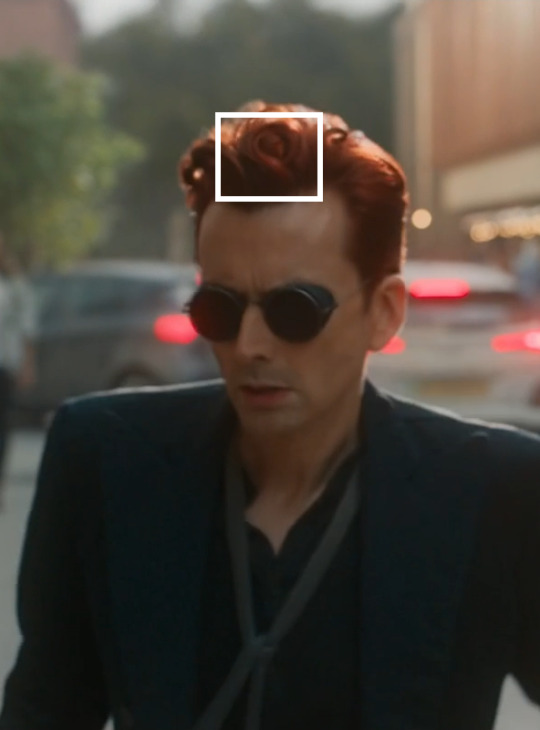
The streak is difficult to find, but I think I found it here, just before Aziraphale crosses past Crowley as they approach the sidewalk in front of Maggie's shop.
...
Hairstyle Changes
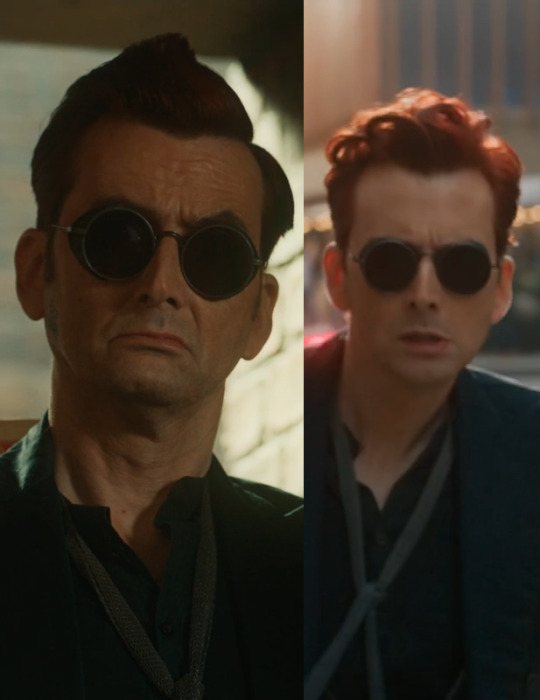
The sideburns have shortened. The hair is more red in the sunlight. More curls in the top hair have returned.
...
Earthly Objects
(For reference: Earthly Objects | The Ball Invitations Checklist)
Aziraphale has the clipboard and pen. Crowley has a question with, "You just did what I think you did?"
Both of them cross the street together, including crossing over the threshold that is the edge of the sidewalk. Aziraphale crosses first with Crowley hurrying behind, briefly passing him before they reach the likely next edge of a sidewalk.
Aziraphale says the names, "Maggie" and "Nina."
For paying attention to the pockets...


The Tied Hands are retied...and then, I don't know what's going on. They could be doing something more or showing how they stay tied because of Crowley being understood to cross the street, which includes crossing over the threshold that is the edge of the sidewalk.
Copied and pasted from my recent post on the Double of The Pocket Trick.
Below is a log of what that entails, for reference.
Crowley has his right index finger extended. His left index finger is probably also extended, but it's blurred. The left hand brushes up against Crowley's jacket. At the same time, the back of Crowley's right shoe is blurry but also visible.
While the watch is visible, the face of the watch is not as clear as what usually happens during retying.
Crowley rushes to pass Aziraphale, placing himself on the "wrong" side.
Then the tie strands swing such that the strand closest to Crowley's left hits his lapel, but it's not a clasp. It's actually an upper part of the strand below the knot.
The strands swing to Crowley's right, and there is an implied strike that could be happening on a lapel edge that the camera cannot see.
After that, the tassel, or thumb, of the right-most strand shifts up enough to be seen.
The tie strands spread apart with the left-most one then indeed having a clasp touching a lapel edge. However, it's only the upper part of the clasp that's visible.
Then this strand swings to Crowley's right, showing a little of that clasp yet again with another implied or very-difficult-to-confirm strike on a lapel edge.
The tie strands spread yet again...and then cross just before Aziraphale and Crowley would finish crossing the street. The camera cuts away and does not confirm that their shoes reached the next sidewalk.
...
This part could be a word puzzle since we've seen a few, but I don't know the phrase I'm looking for. I've mainly noticed they are "crossing the street," and the strands "cross" at the end.
...
Crowley's Overhead Light from earlier is visually pocketed between him and Aziraphale as the scene starts. That light ends up on Crowley's left, and Aziraphale's right, above ears. Interestingly, that happens as they start the scene on their "wrong" sides. Soon after, it does end up on Aziraphale's left.
They switch to being on their "correct" sides as they start to cross the street, and Crowley has his index fingers extended.
Then he passes Aziraphale, so there's a switch back to the "wrong" sides.
As the scene ends, Aziraphale passes up Crowley. If that's the "wrong" or "correct" side depends on how technical one wishes to get about what qualifies, and I don't have the energy for it. Aziraphale switched on purpose, probably, so I'll go with thinking he has the technicalities considered if he is aiming for the "correct" side by the end of the cut.
...
Various humans are using pockets in the background.
...
Story Commentary
If the Tied Hands have personalities, they are excited here. They are so cute. They confuse me, but I still think they are cute and amusing.
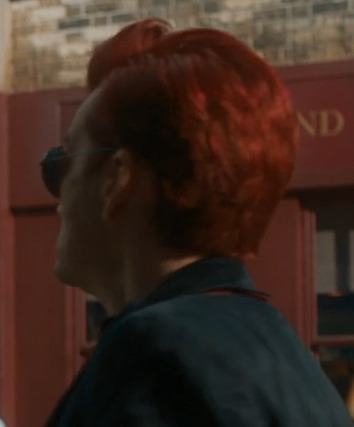
I keep forgetting to note the times I do find the red on the back collar area of Crowley's jacket, but I'm remembering this time. It can be found if one takes the time to look.
...
One of the locations on the list is, "Lucky Snake." Crowley's a snake demon. As for how "lucky" he is, that's debatable.
...
This scene takes the time to show the Bentley and that the Bentley has the plants in the car.
...
This part is more for an assumption on what's about to happen between this scene and the next.
Once upon a time, I saw a post somewhere mentioning that Maggie could enter the bookshop without an invitation. I didn't bookmark it, just sort of filed it away in my head that such a comment was made.
In case you truly do not know, Maggie does get an invitation.
Not every invitation is shown on camera, but the story actually gives us clues for when Maggie was invited, even if we didn't see it on camera.
The name of Maggie's shop is The Small Back Room.
The second location on Aziraphale's list is "Backroom," though there is some noticeable space between "c" and "k," then "r" and the first "o".
Still, the "Backroom" is referring to Maggie's shop.
We can figure that out because in this scene here, Maggie's shop is visible in the background while Crowley and Aziraphale talk about what Aziraphale just did with giving away the book.
Then they cross the street toward Maggie's shop.
The camera stops shy of showing the record shop again after they've passed the car.
The episode cuts away to another Shax scene as she talks with Furfur.
The third location on Aziraphale's list is "Goldstone's," which is the location he and Crowley will visit after that Shax scene.
Aziraphale is going down the list.
So, Maggie was invited second, and the invitation was not shown on camera.
...
That's it for this post. Sometimes I edit my posts, FYI.
...
Main post:
The Sideburns Scheme
#crowley#david tennant#good omens 2#good omens#good omens s2#good omens season 2#good omens meta#good omens analysis#good omens crowley#crowley good omens#good omens clues#good omens theory#good omens theories#good omens speculation
33 notes
·
View notes
Text
Family Units and Foreshadowing in "Too Far Gone" (TD)
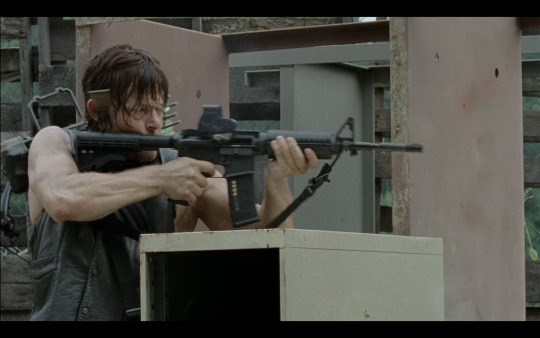
I'm not entirely sure what is happening, symbolically, in episode 4.8 "Too Far Gone," but looking back on it now, it is providing a lot of very interesting foreshadowing for the remainder of the series. What happens in 4.8 essentially symbolizes a massive schism in the prior established "family unit," ie: the patriarch, Hershel Greene, is beheaded, and all of his children, devoid of home and purpose, scatter to the wind, forming smaller, separate family units. The "way" in which they scatter is important, as is everything in Scott Gimple's first season as showrunner, and that's what I want to talk about today.
The family units we see escaping the prison foreshadow in many ways the formation of similar units and dynamics going forward, mostly. That "mostly" is important. Here are the groups, exactly as they leave the prison:
Maggie, Sasha, and Bob
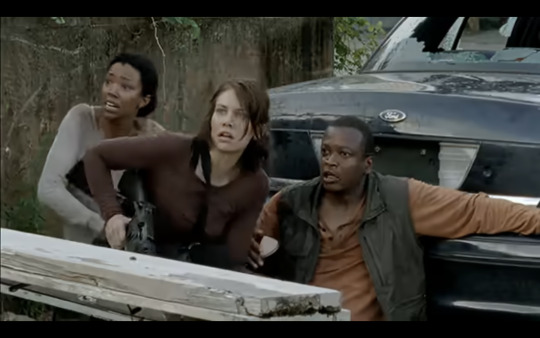
Tyreese, Judith, Lizzy, and Mica
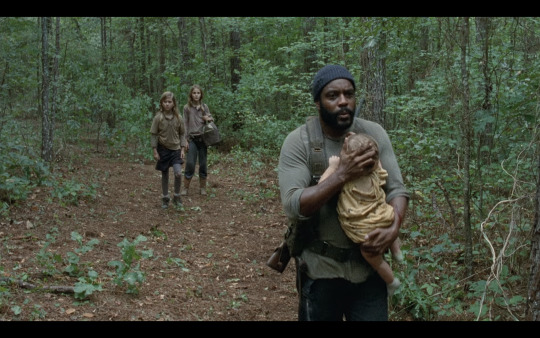
Daryl and Beth
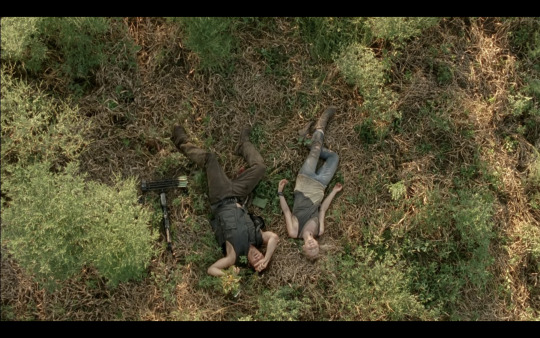
Rick and Carl
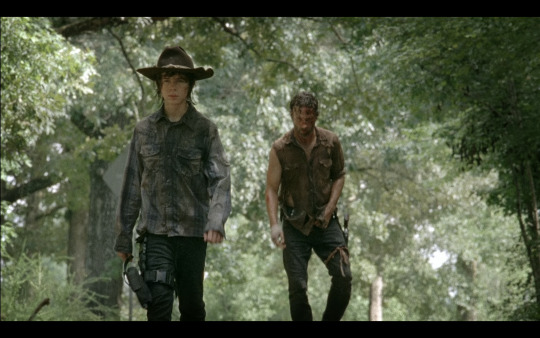
Michonne
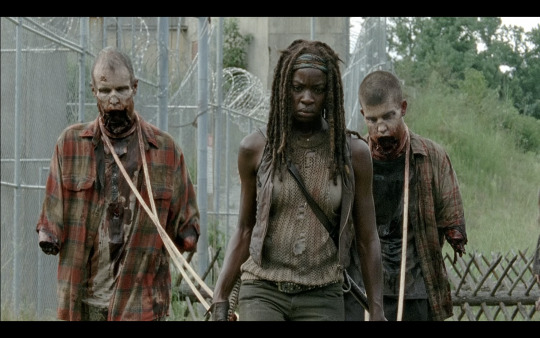
Glenn and Tara
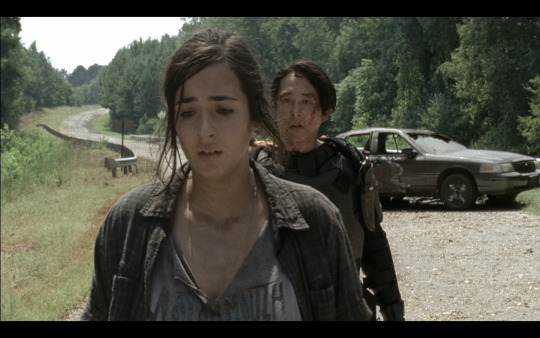
Carol is not at the prison during the showdown with the Governor or when it falls. She has been driven away and exiled by Rick. Though she will quickly converge with Tyreese and the girls, it's important that, at the time of the prison's fall, she is not there.
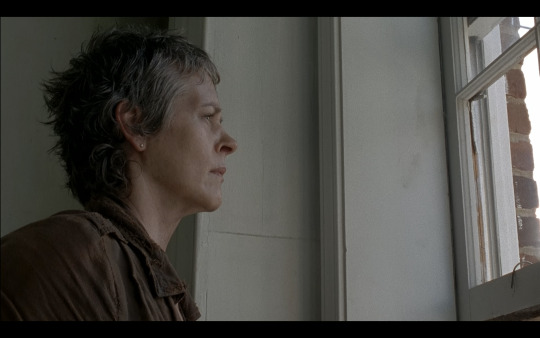
(Note that in this post, I'm ONLY going to discuss the original main characters who lived at the prison with Rick, under Hershel's guidance, and who lost their home in 4.8. I will not NOT be discussing the new characters who show up between 4.8 and 5.8, ie: Abraham, Rosita, Eugene, or Father Gabriel. I also won't really be discussing Tara, as even though she groups immediately with Glenn, she is not a part of the original family unit.)
We know that Gimple had very specific plans and choices for these groupings, or what I'm referring to as family units. In terms of the situations they encounter, symbolically, let's see what happened and what's still going on, with particular attention to the characters that we know are still alive:
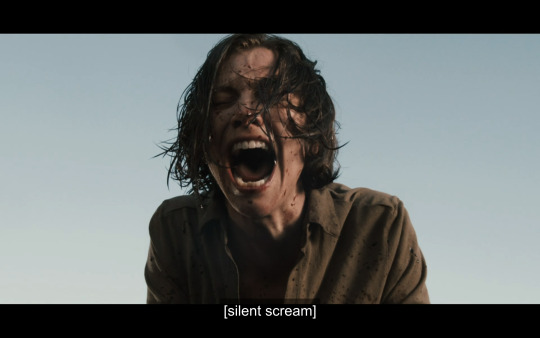
Maggie: Maggie tries to leave Bob and Sasha continuously during her search for Glenn after the prison falls. She searches for Glenn to the detriment of whatever connections she has left, and not once does she consider that her sister may also still be alive. She has a hard time relying on other people and doesn't want anyone else to feel responsible for her burden. Maggie's tendency to isolate herself from and even actively fight those who want to help, and her persistence at going it alone has only worsened over the seasons. Further, and perhaps most importantly, Maggie and Glenn each have a difficult time existing independently of one another in 4b. Maggie refuses to accept that Glenn could possibly be dead, and her lack of acceptance of the current situation, though it is romantic in some sense, foreshadows her current lack of acceptance and ability to move on. The entire fact that they're separated at all is foreshadowing for Maggie's entire future arc. She gets lucky in 4b, finding Glenn again, but she knows now that this is no longer a possibility, as she watched him die, and so her inability to move on, to move forward with her life and to let go of the past has become perhaps her most glaring flaw.
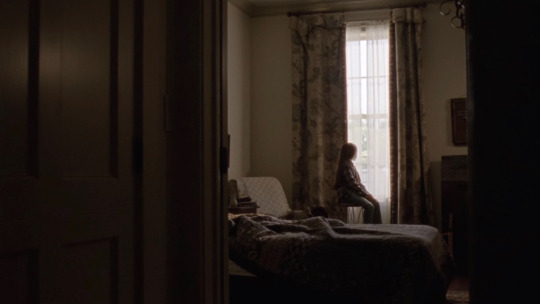
Judith: Judith was just an infant in 4b; however, her situation, basically right up until the final moments of The Ones Who Live 1.6, has stayed almost exactly the same. Raised by surrogates, with surrogate siblings, missing mother, missing father, setting down, then uprooted again and again and again. AND YET, she is somehow immune to mortal danger. Everyone around her is basically willing to die for her. Even when she IS in danger, she is saved and saved again, sometimes without even knowing it. A blessed and well-loved child.
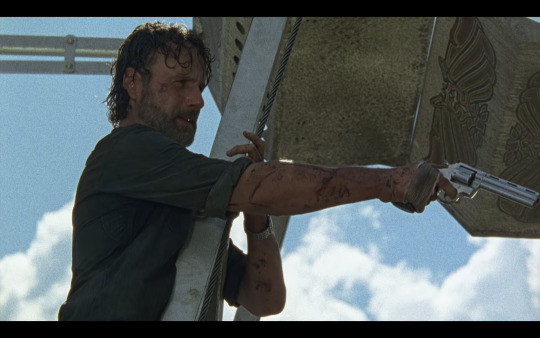
Rick: In "Too Far Gone," Carl saves Rick's life. When the two escape together, Rick is horribly injured and seems to "die." He is dreaming. Carl as Rick's savior, and Rick as the sort of sleeper king is a theme that crops up in both AOW and again in TOWL, when we learn that it was Rick's dreams of Carl that kept him sane and alive for so long while held captive by the CRM. Carl's encounter with the dead canary in "After," I believe, foreshadows his death. The dead canary is a nod to the old adage "a canary in a coal mine," meant to warn coal miners of the deadly presence of carbon monoxide. Carl's death in season 8 is a grave warning for Rick. Losing his dreams of Carl while at the CRM is also one of the main precursors to Rick's most suicidal moments.
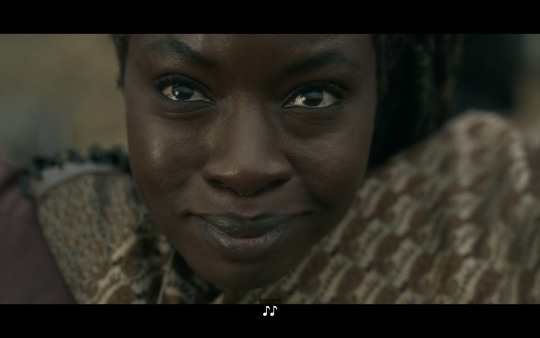
Michonne: Michonne escapes the prison alone, because Michonne, though she is a romantic, maternal character, defaults to an intense, very guarded form of safetyism when she loses someone she loves. She shuts down, eschews socialization and all alliances. We see this pattern repeat itself after Rick dies in season 9, and she cuts off Alexandria from both Hilltop and the Kingdom as a means of staying safe. She also initially eschews socialization after she leaves Alexandria and begins her search for Rick, once again, alone. But every single time, Michonne comes around at the behest of her children. After the prison, Michonne finds Rick by tracking Carl in the final scene of 4.9 "After." She then finds Rick again in The Ones Who Live, but only after she decides it's finally time to return home. Michonne, from the first time she shows up at the prison with the basket of formula, is the eternal mother character.
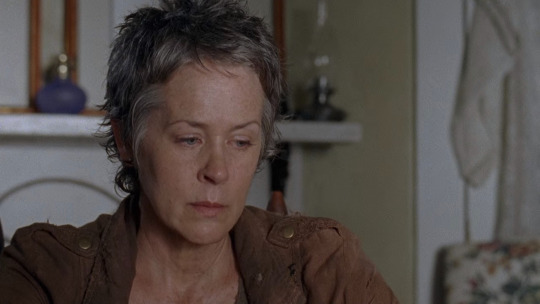
Carol: Carol being outside the fray during the confrontation with the Governor, and seeming to come in from the cold at the perfect moment, is hugely formative for her characterization. Carol finds Lizzy, Mica, and Judith just in time in "Inmates." She also shows up at Terminus just in time in "No Sanctuary." After 4.4 "Indifference," Carol continuously tries to leave the family unit, but it's precisely her tendency toward the fray that often presents her with opportunities to help. In fact, it's precisely because Carol is trying to leave at the end of "Strangers" that Daryl sees the Grady car go by and is able to grab a lead on Beth. Carol also leaves at the end of season 6, which causes her to miss the second major confrontation of the series, with Negan, but it also drives Morgan and Rick to the Kingdom, where they are able to find help with their ensuing war. Carol has come a long way since these old and toxic tendencies toward self-preservation; however, we see now, once again, how she leaves home to go searching for Daryl. She still communicates as a kind of lone wolf, much more so than Daryl does, which is who I will be talking about next.
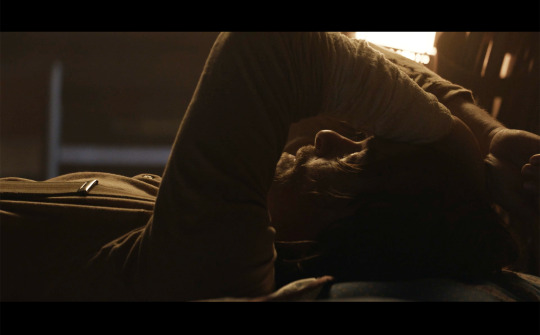
Daryl: Why have I saved Daryl for last? Well, because of all the characters who are still certainly left from the fall of the prison in season 4, Daryl's characterization has been the least intuitive in terms of how it relates to his prison escape scenario. Though Daryl fights most of the battle alone at the prison, in the end, he is found by Beth. Daryl is rarely found. In fact, he's never found. Usually, it's him doing the finding, which is why I believe that his core desire as a character is, actually, to be found again, ie: I belong with you. Find Me, calling back to the original story he tells to Andrea in "Bloodletting" about the time he got lost in the woods as the child. This has yet to take place.
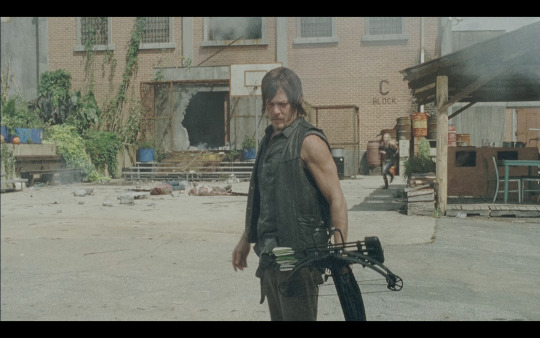
"Find Me" is actually a great episode to look at in terms of how Daryl's character has unfolded over the course of many seasons. "Find Me" communicates Daryl in a similar time in his life to what happened after the fall of the prison. He's lost a major member of his family, blames himself, and has lost his home because of it. He is wandering around, searching for some sign of Rick, with zero luck at all. HOWEVER, in "Find Me," Daryl is alone. This lasts, of course, until he finds Leah, a poor replacement for Beth, even though, as we learn in season 11, she does kind of look like her. After the Commonwealth situation, Daryl leaves home, once again, alone. Many people thought that he was going to leave with Carol; however, he didn't.
Daryl has never had sustained sexual tension with another character since Beth, and if we count Leah, we should consider that main themes communicated in "Find Me" are confusion, disorientation, and memory loss. The episode also lacks the innocence and Edenic beauty of "Still" and "Alone." It is not about finding love or some light in the darkness. It's entirely about loss.
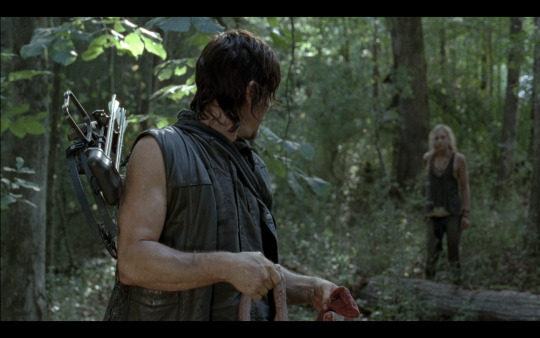
This could be traced back to season 4, in which Daryl does lose Beth. However, the exact circumstances for him running away from the burning prison with Beth and going on a sacred quest for her at a country club, then going to the backcountry moonshine shack, ending in a screaming match and a physical embrace, a warm, tipsy conversation on the porch, and literally lighting the past on fire does not track with any future situation he goes on to encounter. What I'm saying is, whatever all that was foreshadowing, it hasn't happened yet. The warmth, intimacy, and innocence has been gone from Daryl's life since he lost Beth in "Alone."
To use Norman's own words, there was a "taste" of romance "in the air" from the moment they escaped together, for as long as they were together on the road, and even when they part. The rabbit and the strawberries in the aptly titled "Us," keep the feeling of love and possession and the romantic tension alive between them.
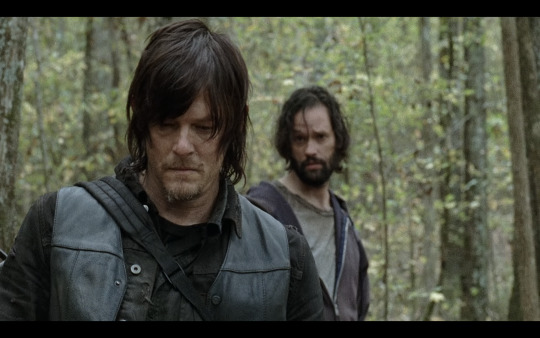
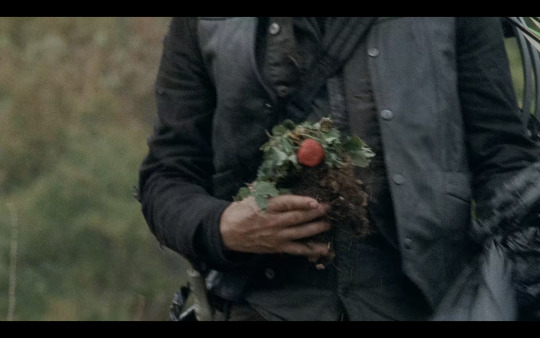
I often think of "Alone" as a love episode. Sasha and Bob, who more obviously kindle a romance and kiss on the train tracks, while Maggie and Glenn search for each other with desperate abandon, are obvious foils for Beth and Daryl. It would not make sense to create an entire episode surrounding finding, losing, and searching for love, and to have only one of those stories be about platonic love. It makes sense because they are all different stories of romantic love.
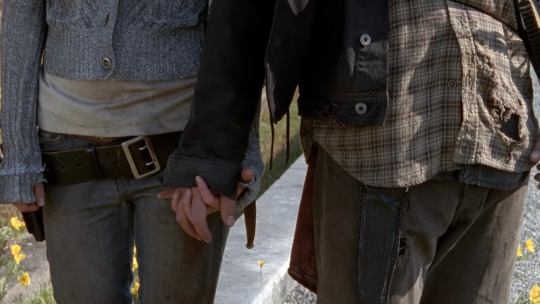
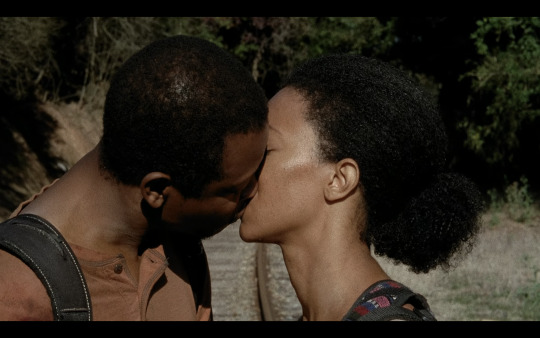
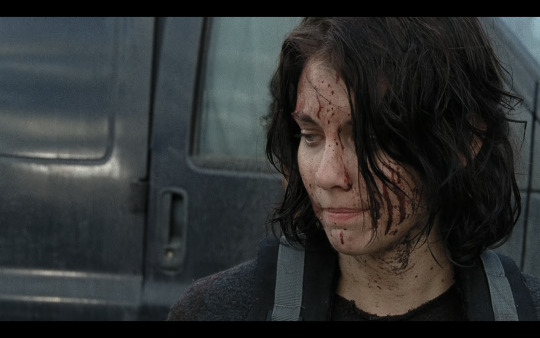
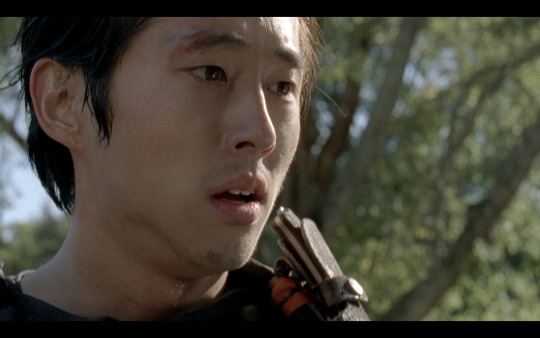
(For the record, I don't acknowledge people who argue that Bethyl is platonic, or sibling-coded. I don't care how loud they are. There is zero evidence for that sort of dynamic in the actual show, while the evidence to the contrary, re: holding hands using the soulmate grip, Daryl's bridal carry, how he looks at her while he lies in the coffin, his confession, her confused and subtle "Oh"...regardless of how it might make some people feel, is overwhelmingly obvious. Sorry, haters.)
Anyway, on a more "meta" note: Season 4 ends with Beth off-screen, in another dimension. She is out of sight, and nobody knows whether she's dead or alive. Meanwhile, in "A," Rick reunites with his family, and they are at the precipice of a war with the Termites, a group that seems to, in many ways, foreshadow the CRM. This looks a lot like what's going on now, or what's just happened. Daryl is alone, about to reunite with Carol. Rick just reunited with his family. Major General Beale, a nice Gareth proxy, has been defeated.
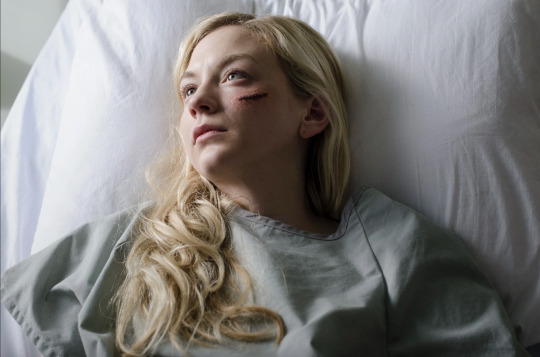
Many speculated at the time of 4.16's release that Beth might have been taken by the Termites, just as we all speculate now that Beth may be, somehow, with CRM. I believe this means there's something much more complicated going on in season 5, in terms of the Termites, Grady, and their possible connection to the CRM. Since many TDers do actually believe that Grady was a covert research initiative started or at least sustained by the CRM, the foreshadowing, which holds that, while all this other stuff is going on with Rick's group, Beth is somewhere hidden over the rainbow, feels very much in waiting.
So much of season 4b-5a has been rehashed and repeated over the years and was most recently repeated via Rick and Michonne's reunion in TOWL, that it's bizarre to also look back and say, Hey, how the hell does Daryl fit into all this? Daryl, who actually isn't alone in 4b? Daryl, who actually finds and chooses potential for a relationship? Daryl has, over the course of the series, made friends with compatible women. I am talking about Denise, Connie, Leah, Isabelle. However, not a single one has ever maintained sustained romantic or sexual tension with Daryl. Not one has yet to change his mind about the goodness of people. Each of them, he either leaves or loses, and even if he decides to stay (re: in France), it's due to obligation and inertia, not choice. Daryl has not once consciously chosen to settle down or to make a. home, specifically with a woman, since Beth. He has never run away with a woman into a time of innocence and tabula rasa, starting over for the sake of moving forward, finding peace, and burning the past. He has never found peace. He has never let go of the past.
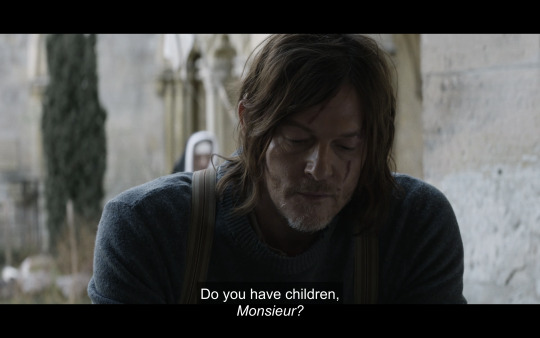
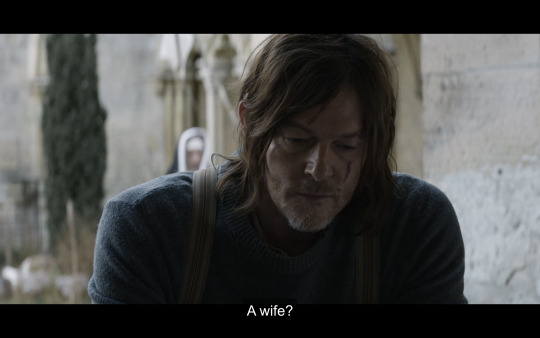
All of this is to predict that he will, of course. He will get his happy ending, which we've basically been told is the thesis for his spin-off, amidst a flurry of hints that this is related to finding a wife and having a family of his own. Not Rick's family. His own family. And when Carol arrives, fresh from her latest escape attempt, and self-destructing via whatever it is she's running from, she will help him get there, just as he will help her find her faith again. So much like what happens in "Consumed" and, to an inverse degree, "Find Me." In both episodes, it's Carol's attempt and desire to run away which drives Daryl to the mysterious location of a missing blond with whom he once shared a dalliance in the woods.
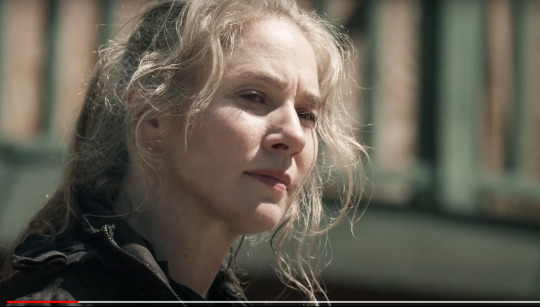
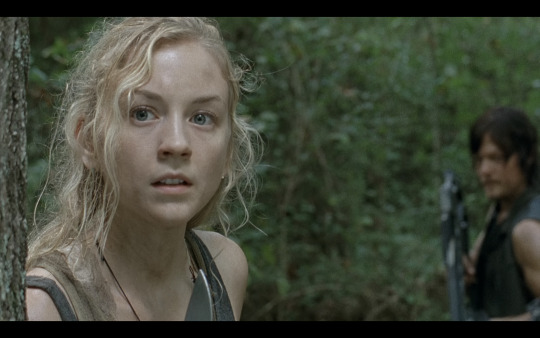
42 notes
·
View notes
Text
I’ve been thinking on Gabrielle elsewhere & I thought we could discuss her here? I’m curious regarding everyone’s thoughts on her & feelings towards her!
I find her desire to be in nature & shun humans very relatable & also, likely, the true secret to surviving immortality. Also, I’m sure 100% of us born female can in some way relate to Gabrielle’s experience. And imagine how much worse her experience of being born female must have been in the 1700’s. What a claustrophobic thought! I don’t know how I: someone who has never dated or loved could have survived back then!?
But her coldness, I find so difficult: to Lestat, who she says she loves & who she does sometimes show love to… in a way I find her way more damaging to Lestat than his Father & brothers, who simply hate him. At least Lestat knows where he is with them. Gabrielle intermittently offers Lestat love & hope… but only ever on her terms…. And then she pulls away to the TRUE opposite of love. Which is not hate. It is indifference. It feels to me like at least 90% of the time, Gabrielle is indifferent to Lestat. What could be more loveless than that? Yet he loves her, like a little donkey, reaching for the carrot of her love. And she kind of keeps him dependent on only that love too. Lestat has nowhere else to feel love from… at least until his Mastiffs.
Gabrielle disconcerts me even when she listens to Lestat in crisis. Again, sometimes she shows love. But often she treats Lestat like an interesting work of art… he is interesting to her for as long as she gets some interesting artistic fulfilment from what he says. But she as often responds with her own experience or merely leaves him be & withdraws again as that she offers comfort, I feel.
Then, when she is turned a vampire, I suppose it’s unsurprising, given who she is that Gabrielle feels zero empathy towards any human anymore. But it’s truly terrifying to me.
And in the end, I just can’t forgive Gabrielle for not teaching child-Lestat to read, as a voracious reader herself. It would have taken so little time & she would have gifted him worlds. But no: she could only ever offer Lestat a thing money could buy, for him to work out entirely alone. Rarely ever love.
I know Lestat loves Gabrielle, but I don’t think what Gabrielle feels towards Lestat is love. I wonder if maybe she even envies him in part, because he is a boy & that could influence some of the ways in which she denies him? Of course, she also admits she keeps Lestat trapped at home as surely as his Father & brothers, so perhaps Gabrielle never teaching Lestat to read isn’t her ignoring or not noticing his needs & desires, but rather acquiescing to her own: Gabrielle doesn’t want her son to be literate as it could be a means for him to escape his home & then she would be entirely alone?
There are such complex dynamics. And I’ve not even touched on how Gabrielle shares her sexual fantasies with her teenaged son yet…
Of course, it’s clear in part Gabrielle has postnatal depression, in how she feels nothing towards any of her children (& we must remember that Lestat’s surviving brothers were certainly loved even less by Gabrielle.) And poor Gabrielle was trapped from a young age in a loveless marriage, without hope in a way that is so different to 2024, yet was so common 250 years ago (almost Universal?) that we can imagine… but it is only imagining…
But still, I have such complicated thoughts towards Gabrielle. On the one hand, I find her so relatable & I find her withdrawal from humanity relatable too… but that’s from my perspective as someone with few humans in my life. I deeply do care about the few humans that aren my life! But her coldness & lack of empathy - honestly, it makes me feel like I’m standing on the edge of a cliff, teetering over an infinite void! I find it terrifying, unsettling, deeply disturbing.
I want to do a poll, but I’m unsure the question… let’s see… (also note, I haven’t fully discussed gender… I refer to her as “her” here, as she is in the books, but I think she is likelier to not be “her” in the show, at least in modern day, which I’m really looking forward to how she is written & portrayed.)
I am fascinated to experience her TV self, but I have such complicated feelings towards Gabrielle.
#interview with the vampire#anne rice#amc interview with the vampire#lestat de lioncourt#the vampire lestat#amc iwtv#iwtv amc#iwtv lestat#gabrielle de lioncourt
28 notes
·
View notes
Text
FLOCK: World + Plot




Flock is set a few decades after a final war, in which an EMP was set off and most tech was rendered unsalvageable. The society still crawling from the ashes relies heavily on agriculture; the more you know, the further forward you can move. This has resulted in multiple groups popping up revolving around this shift in value, one of which is known as The Church of the Long Grass. With the loss of tech, the planet has started to make moves in returning to itself, and with this has come the appearance of what's referred to as gryffins-- a sentient beast of multiple eyes, teeth, and a set of wings. Some fear them, some revere them, some make bargains for work from them.
This story is essentially, a long road trip moving across the country. The characters go from ruin to ruin, abandoned buildings, empty subway tunnels, and so on, in search of their final destination (something difficult, as it keeps moving).
MAIN
When Valentine was 6, they met another child for the first time, as well as their first gryffin.
When they were 10, they burned their first church-- the one that had held them all their life, which had tattooed them, had ruined their chances at a normal childhood. They remember giving a warning to the high priestess before turning their back on the Church of the Long Grass. They were found by another gryffin, one full grown, who taught them the dynamic of predator and prey, and with this mindset Valentine began to move through the world on their own.
Now in their 20s, and many burnt churches behind them, Valentine looks for someone precious. They've been searching for her, Gabriel, another child born to the high priestess and Valentine's mother soon after they left the Church. Haunted by their past, they fight tooth and nail to find her, and when they do they take her into their arms and care for her.
Of course, this doesn't mean they change their ways. Valentine is still angry, still has churches to burn, still has fights to win. Gabriel, for her part, knows what Val is doing is wrong; but how does a 9yo articulate why their anger and grief is being expressed in a way that only hurts? The two continue their lives together, traveling without destination, clumsy in their affection for each other, always too intense or giving to little. Valentine is furious, and Gabby is shut down-- they reach for each other and just barely miss.
Now, Kazmir, for her part, has spent the last few months roaming as well, her gryffin Mozzwood always with her. She suffers the loss of her mother, and the wounds she and Mozz have gained during their travels, but she continues to believe in the best of everything. Recently, however, she received news: her mother alive and well, traveling in the northern states. That's where she's headed. And it's on this journey she finds Valentine and Gabby, an old childhood friend and their newly acquired little sister.
From here, the four continue their travels together. Valentine's a good brawler, Gabriel has good knowledge of agriculture even at her young age, Kaz is an excellent cook and people person, and Mozz. Well, he's a gentle soul and looks lovely. Val and Gabby, having no real destination, have agreed to help Kaz find her mother, and as time goes on they begin to open up to her. What Kaz finds in the two is a tangled mess of trauma, rage and fear and grief that neither sibling knows how to confront, let alone heal from. She becomes the mother of the flock, tending to wounds, and as she works to heal them, they begin to give back and heal her as well.
The end destination for these four is a moving target, Kaz's mother traveling as well. Will they reach her? Find her? Be welcomed with open arms? Only time can say.






#ocs#flock#verses#BE KIND IM NOT A WRITER.......#I JUST GOT A KEYBOARD AND A PEN AND A WHOLE LOTTA HEART
34 notes
·
View notes
Text
S1E2 – The Book Write Up P1
– 2 days before Armageddon and 1656

On my most recent rewatch of this episode, I felt like overall it was much more narrative in nature than the first one, so there might not be quite as much waffle in this write up. Then again, this episode includes both the jacket cleaning and the wall slam Aziracrow moments, so perhaps let’s not count our chickens…
Let’s dive straight in then. It find it interesting that Aziraphale doesn’t appear surprised to see Gabriel and Sandalphon (described in the script as “thuggish”) in his book shop at all. I do love this little scene though, it’s pure comedy which, considering where we left off at the end of the first episode, is a good way to remind the audience that this show isn’t meant to be all doom and gloom. It’s also nice to see the comparison of knowledge of human behaviours here; Gabriel completely clueless and Sandalphon feeding him information he believes to be appropriate - only Aziraphale has any hint of behaving naturally at all, though there is something to ponder on here. Is his obvious discomfort at the mention of pornography caused by genuine embarrassment or because he has learned the appropriate human behaviour during his time on earth? I think it’s the former. We’ll see this human etiquette dilemma echoed in the first episode of season 2, which has a more obvious reference to its connotations so I will address it properly there. Let’s just say that Aziraphale’s sensitivities here could be attributed to forbidden knowledge.

I also love the fact that Aziraphale does his best not to make his customers feel awkward in this scene. Almost as if he actually wants them there. Which would mean actually selling some books somewhere along the way… He must just be being polite because that is clearly nonsense. It makes me giggle that despite trying to maintain an air or professional distance, he calls the two angels by name in front of the whole shop, completely undermining any attempts he was making at pretending the two “men” in front of him are unknown to him. Silly angel. And just to round this mini section off, this is my favourite line of the scene, which could only be delivered by a being that has no idea of the social connotations of buying porn:
We human beings are extremely easily embarrassed. We must buy our pornography secretively.
For those who don’t know, Mrs. Beeton’s Book of Household Management (the book Gabriel has picked up) is just about the furthest thing from porn you could possibly have – it’s a guide to running a household in Victorian Britain, written for married ladies of the time.
There’s a pretty delicious irony shown in the back room here – Gabriel marvelling at how easily humans are fooled whilst simultaneously being fooled by Aziraphale. The irony is further driven home by the fact that we, the “easily fooled” can tell Gabriel is being duped.

I would just like to take a moment to truly appreciate this beast that sits on a desk in the back office:

I work in IT (cyber security to be exact) and this thing gives me chills, of both the good and bad varieties. I do really love the way that there are so many little details hidden around the sets of this show, and this one goes to show how stuck in the dark ages Aziraphale is with “modern” life. I’d wager he only bought it because it was suggested to him in the first place. I’d be hugely surprised if he had used it more than once in its lifetime - probably turned it on, decided he didn’t like it and turned it off again.
There’s a lovely bit of character development here for Aziraphale, and it’s something we don’t get to see very much of with him – his ability to stay calm in difficult situations. He deals with the unexpected arrival of the two angels in a very skillful way; inventing a (believable) reason for why Sandalphon is able to smell evil in the shop, conversing with the two intruders in a polite but appropriate way, managing to lie to them without any hint of a fluster. I am guilty sometimes of thinking of the angel as a bit of a flake but scenes like this really help to remind me that actually he can be a total badass when he needs to be, after all Gabriel and Sandalphon both leave appearing to have no concerns about Aziraphale’s behaviour whatsoever.

From Aziraphale’s homely, cosy, cluttered book shop, we’re transported straight to Crowley’s sparse and cold-looking apartment where everything clearly has its place – another clever way of reminding us that these two characters are polar opposites in a lot of ways.

Interestingly the script describes Crowley’s apartment as being starkly white but I feel like the series realisation of it is much truer to his tastes. I also feel that seeing the demon in his own completely separate space is meant to serve as a reminder to the audience that he and Aziraphale are, supposedly, nothing more than good friends. As such it makes perfect sense that they should both have their own “home bases”, though I find it interesting that we never see Aziraphale at Crowley’s flat – in fact I don’t think there is evidence to suggest that he ever goes there at all (body swap incident aside). I’m pretty glad about that – Aziraphale is far too “soft” to be anywhere near comfortable in that apartment in my opinion. Coming back around to my own head canon (in which Crowley and Aziraphale are very much together at this point in the timeline), it does seem rather fitting that the flat is so sparsely furnished – I don’t really think Crowley spends that much time there (the script actually describes it as feeling “unlived in”), though it’s a good thing he wasn’t at the book shop for Gabriel’s visit in this particular instance. Regardless of whether or not Crowley really “lives” in this apartment, he’s clearly comfortable there as we see him prowling around without his glasses on.
The presence of the Mona Lisa sketch behind Crowley’s throne of a chair (why does he have such a grand chair anyway?) is explained in a deleted scene from the script – he bought it from Leonardo da Vinci himself during an evening of drinking (obviously).

I’m pretty sure that Crowley was about to call Aziraphale in this scene but for what purpose I have no idea – I don’t feel like there is anything more to be said about Armageddon at this point. I also don’t know why he decided better of it and stops himself. I’m not convinced there is anything in this as the interaction with the phone isn’t given in the stage directions of the script, I think it’s more likely part of the setting of the scene for the communication we’re about to see take place through the television.
I want to talk a little bit here about noises that are used in the soundtrack for when a miracle is performed as it’s something I believe will become important in season 2. Like REALLY important. But I’m getting ahead of myself. For now, let’s just note that at this point we’re introduced to the sound we will be hearing that signifies a demonic miracle taking place (which Crowley does to turn on the TV – either he’s being incredibly lazy or it’s a deliberate attempt to introduce us to this noise. I vote the latter). You can hear it in the clip below, immediately after the noise of Crowley clicking his fingers, underneath the talking from the TV:
I can’t quite place it as a sound, the closest I get to describing it is that it’s like the noise you get when you use a brush on a cymbal, or maybe sleigh bells that have been sped up. Either way, it’s distinctive. I’ll visit this concept again later, but for now we can just shelve the concept of the show giving a clear indication that a demonic miracle has just been performed for later reference.
I love the way television communique subtly strengthens the idea of communication over human broadcast mediums (like the radio in the Bentley) – this is mentioned in the book as being Crowley’s idea originally that has now turned sour for him. It’s worth noting the discussion prior to the arrival of Hastur and Ligur around the increasing of international tensions, which provides another device to lay the groundwork for the method of execution that Heaven has chosen for Armageddon. When I pick up on little things like this, I really am astounded by the amount of thought gone into this show.
Side note about Crowley’s chair:

I got a bit sidetracked on this, partly because I realised Ligur mentions it. I was actually able to find a couple of instances of the chair in various places online. It’s almost always described as a throne, and on one particular (Indonesian) website it’s described as a “King Chair”.
Can we just show some appreciation here for David’s top lip? With the most perfectly timed sneer, he conveys just how much contempt he has for his Hellish colleagues. Blink and you’d miss it:

If you missed the sneering, you can’t miss the undertones in the conversation he has with the two other demons – he has absolutely no appetite for Armageddon whatsoever, and next to no respect for what we are led to believe are his superiors. We do get a gem of a piece of information in this exchange though, which is that Hastur and Ligur are also fallen angels. Not only are they “fallen”, Hastur tells us that their collective falls were caused by an organised rebellion. We’ll learn a little more about the circumstances surrounding the fall of the rebellious angels later, and how Crowley came to be mixed up in the whole thing but for now this just makes me wonder how many other “fallen” there are currently waiting for Armageddon in Hell.
We’re treated to another lazy switch off of the TV here, with a repeat performance of the demonic miracle sound, so if you didn’t catch it the first time around, you really should have caught on by now.
We can’t leave this scene without mentioning Crowley’s take on his own fall:
I didn’t fall. I didn’t mean to fall. I just hung around the wrong people.
If that line doesn’t break your heart a little, you have no place here. The idea that Crowley’s fall was entirely unintentional and unwanted is something that we’ll come back to later, so for now we’ll just make a note of his true feelings about what is likely the single most defining event of his existence. It is interesting that Hastur does not appear to feel the same way about his own fall – 6000 years later he’s still standing by his actions and fully expects his accomplices to feel the same way. Seeing Crowley deliver this heartfelt sentiment to an empty room makes me wonder if Aziraphale has any idea how he feels about it. I highly doubt it but it’s a question I have nonetheless.

And so, we’re introduced to our delivery man. I really like this character because he feels incredibly relatable – he’s just a guy following instructions so that he can keep his job, put food on the table, go home to his loved ones. I feel like what happens to him throughout the series is so very unfair, and in this opening scene we hear that he is also being laden with the “blame” of calling the Four Horsemen when God refers to him as “the summoner”. Poor guy. Maybe that’s the point though, having the most relatable human character suffering the most because of events that are beyond his control. Maybe he’s meant to represent all of us. Deep…
Time for another appreciation take, and this time it goes to David Arnold’s amazing soundtrack. The sheer range of musical styles we hear across both seasons is incredible, and every incidental piece of music used does its job perfectly of helping to set the tone of the scene. The epic setting of the theme tune used in War’s introduction scene is nothing short of brilliant and I think it’s a real pity it can’t be found on the OST. Caveat: I was brought up on Queen, so any music (usually in a minor key, with plenty of broken scales and chords) that sounds even vaguely like rock with a prominent yet mournful guitar solo will have me weak at the knees any day. It’s why I currently sprint finish every run I do to the GO end titles theme (“The Theme That Got Left in the Car”). Honestly I sometimes think if my soul could make a noise, a wailing guitar is how it would sound.

We are now introduced to the namesake of the subtitle of the Good Omens universe – Agnes Nutter. The choice to use the surname “Nutter” for this character was not a random one. Alice Nutter was a woman executed for being a witch in Lancashire (where we find ourselves at this point in the story) in 1612. As much as I would like to believe that Agnes is perhaps a direct descendant of Alice, I have been unable to confirm the names of her descendants past sons and daughters, all of whom would have been too old to be our Agnes (and none of whom are named Agnes!). Anyway, Neil himself confirmed the link as a simple inspiration in a tweet all the way back in 2016, before season 1 was even filmed:

Nevertheless, this is another one of those instances where Neil and Terry have brilliantly woven together factual and fictional parts into a single story, which makes the whole so much believable, not to mention it gives you an appreciation for how much work must have gone into the writing of the book.
There are a couple of minor things of note in the following scene:
Agnes declares herself to be the last true witch in England. I’m not sure what purpose this serves, or what basis the claim is made on (perhaps another of her prophecies?), or if it’s even true.
You can actually hear the noise of the nails hidden in Agnes’s skirt as she walks if you listen. I only picked up on this after I knew they were there. It’s another example of clues being given for those who pay attention. I dare say Adultery Pulsifer should probably have picked up on it but he was obviously too busy being a pompous dickhead to notice.
Agnes’s book of prophecies has received a review from Ursula Shipton, comparing her to Nostradamus. Mother Shipton was an actual historical figure, known as a soothsayer and prophetess. She also died in 1561, almost 100 years before the publication of her Agnes’s book, which makes her review either meta-satire or proof of her own legitimacy. I’m going with the latter.
There is another reference to an apple here, this time of the Jobs variety. I understand its placement serves as a way to explain the Device family fortune in the pre-Armageddon timeline, but I do not think that the returning mention of an apple (regardless of its form) is a coincidence. In this instance, the suggestion is that future generations should partake of the aforementioned apple in order to flourish – not so dissimilar to another apple in another ancient location is it?
Well, I think that’s as good a place as any to finish this part. What was I saying about not being so much waffle? I am trying not to analyse every line, it’s just that in a script that’s this well written, every word and phrase seems to have been so carefully chosen so as to carry its own meaning. Or maybe I’m just being pretentious.

Comments, questions, discussions welcome as always!
#good omens#episode analysis#good omens season 1#good omens gabriel#good omens ligur#hastur good omens#head canon#good omens sandalphon#agnes nutter#adultery pulsifer#virtue device#soundtrack#ost
11 notes
·
View notes
Note
I have a question — a post on intersex you shared said you can’t transition to be intersex. Why not? If mtf, aka male to female, and ftm, female to male exist why is it not possible to identify as intersex, and to do so without being “biologically” intersex? Isn’t it just as bioessentialist to demand people be born with the sex traits medically assigned or recognized as intersex to have an intersex identity? This isn’t a casual question to me. I have been questioning my gender identity and forming my transition goals for a while and it is actually coalescing around a specific intersex amab masc but with some seen as femme physical characteristics identity. I see myself as transitioning to intersex as well as to male as I go ftm. The characteristics and lived experience I will have will fit a number of intersex conditions just as well as I will fit male, and so if we don’t question one identity why question the other? Why act like it’s bigoted to identify as trans intersex when we don’t see it as evil to say be mtf even if afab people have unique struggles from the physical aspect of being afab that TYPICALLY happen? We know it’s wrong to alienate trans women and anyone else mtf or mtnb/mtx just because they can lack those experiences same as it is wrong to alienate cis women and trans men and other ftm or ftnb/ftx people who lack those experiences. In short just because my experiences as trans intersex aren’t the same as a natal intersex person doesn’t make that part of my identity invalid or my connection to an intersex identity false or a lie. It seems very transmed and transphobic to say otherwise.
It is incredibly disrespectful to be saying this to intersex people who are defending a label and identity that we have had to painstakingly advocate for using to describe our personal experiences instead of medicalized, derogatory language. Intersex is a label and identity that is entrenched in a unique history of found community.
Even without this context, according to my knowledge, the mainstream AND scientific communities are in agreement that intersex is a term that refers only to those with variations in sex characteristics that are congenital, meaning present at birth. Interestingly, it is the intersex community that has advocated for more inclusivity with the label and identity, and the scientific community that has sought to restrict it to merely describing genital variations. So, intersex is already as inclusive as it can reasonably be, but it is still not something that shares definitions with being transgender.
For example, Cary Gabriel Costello, an intersex transgender scholar who specializes in discussing the intersections of the intersex and trans communities, notes in a 2016 publication:
Trans* individuals share with the intersex community this problematic pressure to be normalized to the sex/gender binary. Unlike the case of intersex people, who are born sex-variant, (nonintersex) trans* people are born with bodies that are considered satisfactorily to conform to the dyadic sexes they were assigned at birth.
In conclusion, I hope this provides you with more understanding, and I wish you well on your journey of self-actualization. It can be a long, and sometimes difficult, experience that may have no guaranteed answers, so I hope that you find them and that you experience euphoria as your true self. The intersex and transgender communities are not opposed to one another, as we have historically fought the same fight against sociological binaries, but we do not have one-to-one experiences, and that is okay. Happy Pride Month. ❤️
9 notes
·
View notes
Text
I have a question about WLW couples or relationships that I’m sure you guys will be able to help me answer.
Is it appropriate to say it’s a lesbian/gay couple or lesbian/gay relationship if one or both of the women in it do not identify as either a gay or a lesbian woman?
The reason why I ask is that I’m bisexual and a woman but if I was in a relationship with another woman, I would have no problem with anyone referring to us as a lesbian/gay relationship or as a lesbian/gay couple. But my partner might feel differently if she didn’t identify as a lesbian or gay either but bi/pan/queer or some other sexuality in the confusing alphabet soup.
Is that an appropriate term to use or is ‘sapphic’ better? Which I also would have no problem with.
In terms of WLW in TV art/entertainment or storytelling I don’t often have too much of a worry because the characters are fictional along with it.
However…
Xena and Gabrielle is a TV WLW relationship/dynamic I’ve loved all my life. They are my NO.1 OTP of all-time. But I’ve always been wary of referring to them as a lesbian/gay couple or a lesbian/gay relationship because I interpret Xena as bisexual and Gabrielle as a lesbian. But I’ve never worried about calling them a WLW couple or relationship because they’re both women. And so I often just say WLW or queer.
I’ve never really used the term ‘sapphic’ but I’ve seen it been used a lot in regards to Xena and Gabrielle due to them being in the time of Sappho but also because no one can quite agree on their canon sexualities in the Xenaverse fandom. There’s many that interpret them both as lesbian/gay. There’s very few fans that only interpret both as straight. But the one thing that seems to be unanimously agreed upon by all fans is that they have feelings for each other romantically/sexually if not a couple or never made it as a couple.
It’s a bit difficult when it comes to them so it just got me wondering what’s the most appropriate term?
Saying that. Would WLW also be appropriate if one or both in the relationship didn’t identify as women? But rather non-binary or transgender or agender instead.
You think I would know this information by now but I’m honestly not so sure with the sources I’ve been using to educate myself on. They aren’t entirely reliable for accurate and up-to-date information.
And I have a very diverse following on here so I think you guys could tell me more accurate information or at least direct me to sources of where I can find it.
#wlw#sexuality#identification#what’s the most appropriate term?#xena and gabrielle#some lesbian women don’t like to be referred to as gay#some gay women don’t like to be referred to as lesbian#it’s hard okay#what if it’s two trans women in a relationship?#or two nonbinary characters?#what if they don’t identify as anything at all?#I don’t like ignoring minorities#I once wrote this entire piece on trans people being excluded from the confusing alphabet soup because no one knows what to refer them as#I still say LGBTQ but now there’s numbers and mathematical symbols#so it’s no longer just an alphabet soup#I’m very confused#things change and evolve faster than my brain can keep up with
16 notes
·
View notes
Text
Reawakened; Into the Abyss – Domestic prelude
From my CW final assignment. Every other character belongs to me. This story is 5 pages long in it’s entirety. I feel the need to specify that the 4 characters at the end are Sanrio OC’s and the first 3 are Elemental Alicorns.
🌫️💭🕸️📻🪦🍽️🌑🕳️❔👁️🗨️🕒
Thalassorion laid in a paradise–like island, watching the waves caress the beach. Verdanox and Luxvian suddenly ran over, looking up at their mentor. Thalassorion looked down, “What is it?” “Someone’s at the pizzeria. Appreciate they’re trying to open the pizzeria again.” Verdanox said, “We can’t let them get back in, right?” Luxvian added, standing behind Verdanox. Thalassorion sighed and stood up, walking off with the two running after him like they always did when he had to do something they considered interesting enough to witness for themselves.
Lottie helped Yukio, Taffy, and Winnie off the table in the storage room. Outside the room, near the door, sat Fredbear and Spring Bonnie or Tex, who were busy with a Lego set. “Lego’s really improved.” Fredbear noted, looking at the instructions and trying to find the correct set of pieces being pictured. “We’ve been hidden away for the past 37 years, I think about of things other than Lego have changed.” Tex replied. “My point still stands. These pieces are much more..complicated and intricate. They really improved these models and builds. It’s good but also a bad thing. I mean, this set looks like it’s defying gravity!” “Maybe because these are made for kids and kids din’t exactly know about weight distribution? But I think even kids would be able to realize that these parts aren’t properly supported.” Tex sighed as he waited for his friend to finish.
Nearby, standing outside their large music boxes in a corner, floated Jinx and Marionette. “It’s a bit difficult using pronouns other than the basic trio.” Jinx said. Marionette nodded, “What pronouns do you use?” “Oh, I use he/xi/spir/lumi/pup/jin/clow. What about you?” “He/it/ae/xe/ver/spool/string. I don’t know anybody other than you who uses neopronouns.” “Well, Yukio, Taffy, and Winnie use neopronouns.” Jinx replied as the two now sat in their boxes.
“Oh, really? What neopronouns?” Marionette asked. “From what I remember, Yukio uses he/it/fae/spra/fro/glace/antler/chill/fluff/snow/frost/burr. Taffy uses he/coco/rain/choco/puddle/drip/mochi/raindrop/candy/quack/syrup/melt. Winnie uses she/boo/bubbly/ghost/soapy/lather/phantom/whisp/squeak/froth/fizz/mist/scrub.” Jinx responded. “Do you have this memorized or something?” The other puppet asked.
Jinx disappeared into his box and after some comical sounds came out of the box, he reappeared. He held a Sanrio themed notebook and opened it, flipping through a few pages before showing Marionette a page. “Fredbear uses he/teddy/snugg/cuddly/fuzzy/stuffie/hug/pillow/bearie/fur/paw and Tex uses he/ver/spring/bun/tink, if that’s important to you.” “And Freddy and Bonnie?” “Cutest couple in the company–Anyways, Gabriel uses he/it/xe/fae/bea/sparkle/paw/fluff/bun/pup/hug/ze/ae/confetti/sticker/silly/fun/laugh and Jeremy uses he/ey/vey/byte/data/it/input/output/ram/static/type/java/python/01/exe/bass/chord. And can I also tell you Plushtrap and Carl’s pronouns?” “I know I can’t stop you so..”
“Thanks. Plushtrap uses he/trap/puff/chomp and Carl uses he/cake/sweet/sugar/cherry/flesh/rot/candle.” Jinx responded. “I’ve still got a lot more people to write down. I intend to go for Mangle and Endo next. Also, uh, what were your pronouns again?” He added as he clicked his Sanrio pen. “He/it/ae/xe/ver/spool/string. Also they/them but, like, plural. I just like being referred to as more than one, I dunno.” “Probably Lefty.” “Yeah, I’ll have to get that checked.” Marionette sighed as he pulled out his phone. “I’m scheduling an appointment.”
Plushtrap and Carl sat in a small room, drawing. Plushtrap lifted his drawing. “Look, this is you. You fucking suck, loser.” Carl looked up, showing his own drawing. “Yeah, I drew you too. You’re a dumbass. How accurate.” “The fuck does ‘accurate’ mean?” “Oh my god, you’re actually stupid.” Carl sighed.
Carl looked down and pointed at the sketchpad the other small animatronic had done. “What’s in there?” “Uh, nothing.” Carl raised a brow and suddenly snatched it, running off. Plushtrap yelled and sprinted after him, running past a room where Freddy and Bonnie were inside. Freddy was busy doing a Lego set on a nearby table, struggling to understand how to properly put together a particularly intricate Lego building. “Is is that hard?” Bonnie asked. “Yes. Very.” Freddy sighed in defeat as his close friend walked over “Maybe because you’re not on the right page?” The purple bunny robot muttered as he flipped pages back to the proper page. “Oh!” Freddy said, looking closely at the instructions. “Okay, yeah. Your eyesight got better as an animatronic and mine’s got worse–That’s actually probably karma for me making fun of you being blind, huh? Guess I better start praying to some God above for forgiveness. You think God will forgive it makr me more blind?” “Your eyesight can’t get any worse and the same goes for your memory. You always lose things.” “Like what?” “Your hat.” “It just–” “It is LITERALLY on your head.” “Okay, yeah, well..” Freddy sighed and looked back down to the Lego set.
“Shut up, I’m helping you build your Lego city since Fritz is too busy buying more sets and you know he only helps with it involves vehicles.” Freddy said as he finished making one of the supermarket’s walls. “My god, that’s complicated.” He muttered. “Why are you putting the wall on? Wait until you’ve done the inside then put the walls on, that’s common sense. You’re just making it more difficult.” Bonnie sighed.
“You know I’m not smart.” Freddy responded. “Don’t be surprised when I’m dumb or overcomplicate things. That’s, like, my special talent.” “You’re special talent is entertainment, being an idiot is your second.” The animatronic bunny corrected. “Yeah. Was almost my first, unfortunately.”
Out of the room and a few hallways down, Yukio, Taffy, and Winnie were in another room, looking around the dim space. They looked at a screen and walked up to it winnie floated off and looked at a model that was standing, resembling The Singularity from Dead By Daylight; an organic yet inorganic being. She floated around it, her hands in front of her chest but covered by the white sleeves of her oversized dress. She inspected it curiously while Yukio and Taffy stood at the computer. Taffy inspected the screen curiously while Yukio tapped buttons and accidentally turned it on. As the computer turned on, Taffy found a book and dusted it off before opening it. A paper fell out and he grabbed it before coming out from behind the computer.
He walked to Yukio’s side, reading the paper. “What’s that?” Yukio asked curiously, standing on his tippy–toes to try and see what was in the book or on the paper. “‘Questions to ask Vega’ but the e is a 3 and the a is a 4. That’s weird.” Taffy replied.
The computer finished setting up showing a digital version of the model that Winnie was still busy inspecting in the back corner of the room. Winnie looked over. Taffy looked at the paper, “I guess this is Vega. We’re supposed to ask him these questions.” Taffy handed the paper to Yukio who anxiously took it.
“Um, what’s your name?”
“My n4m3 15 V3g4.”
“Okay, what’s your..gender and pronouns?” Yukio said.
“M4ch1n3g3nd3r, v01dg3nd3r, c1rcu1tg3nd3r, 5t4rc0r3g3nd3r, 43th3rg3nd3r, 4nd h3/1t/x3/v3/43/3y.”
“Okay..” Yukio drew out the word. “Uh, any other labels?”
“Cyb0rg, 5ynth, t3chn01d, m3ch4n01d, fl35hb0t, 41–b31ng, 3nt1ty, 4nd 4ut15t1c, 4DHD, 53n50ry pr0c3551ng d150rd3r, 5ch1z04ff3ct1v3, 4nd hyp3rthym3514 th4t c4n b3 tr1gg3r3d by 5yn35th3514.”
“I don’t know what any of that means.” Yukio frowned up at the screen.
“[OBSTACLE DETECTED], [SEARCHING FOR SOURCE OF OBSTACLE..]”
Yukio stared up at the computer silently as Taffy stood beside him. Winnie floated over to the two boys, also watching the screen as it loaded. A multitude of screens appearing before it picked a clip of Yukio standing before it and saying he didn’t understand what was shown before him and analyzing the clip.
“[OBSTACLE FOUND], [OBSTACLE; FAWN BOY DOES NOT UNDERSTAND WHAY IS BEING TOLD]. [SEARCHING FOR SOLUTION..]”
“[SOLUTION FOUND; TRANSLATION FROM LEETSPEAK TO BASIC ENGLISH], [LOADING; LEETSPEAK TO BASIC ENGLISH TRANSLATION..]”
“My name is Vega. Machinegender, voidgender, circuitgender, starcoregender, aethergender, he/it/xe/ve/ae/ey. Cyborg, synth, technoid, mechanoid, fleshbot, AI–being, entity, and autistic, ADHD, sensory processing disorder, schizoaffective, and hyperthymesia that can be triggered by synesthesia.”
Yukio looked down, “I can’t write this down, I don’t know how to spell like that.” He said sadly before looking to Taffy and Winnie for comfortm
“[OBSTACLE DETECTED; FAWN BOY CANNOT WRITE PROPERLY DUE TO LACK OF HIGHER EDUCATION]. [SOLUTION; PRINT RESPONSES].”
Suddenly, the machine started making churning noises and soon, a paper came out with the questions and Vega’s answers below. Winnie floated over to Yukio, looking, at the original paper that was aged and ripped at the edges from its age. She took the paper and flipped it over. “Oh, there’s another question.” She said, making Yukio and Taffy look over curiously. “‘Design a Whimsy Wonderland animatronic’. What’s ‘Whimsy Wonderland’?” She asked, tilting her head. The computer immediately took the orders.
“Name; Niji Sparkle.
Gender and pronouns; cynosgender, glittergender, sodagender, sparklegender, fizzyfluid, Backroomic, neonradientgender, neongenderflux, shinjugender, sodaglowgender, and he/spark/fizz/neon/kiro/bubble.
Alterhuman labels; bubblekin, sodaheart, glitchkin, and keroid.
Neurodivergent labels; cerebriot, dreamshifted, sparkletouched, echoedmind, popkinesis.”
The computer progressively made an image of a Pitbull puppy before throwing the model out. The model, Niji Sparkle, stood up. He waved happily at the shocked trio. “Hi, I’m Niji Sparkle! I’m a Pitbull.” Niji said. A hand suddenly came out of the machine, took the response paper it’d made, and put the model of Niji Sparkle and his information on the back before putting it back in Yukio’s hands then disappearing inside the machine again.
“What do we do with him?” Taffy asked. Yukio shrugged, “Um, bring him to Lottie?” Yukio replied. The boys walked off to go to Lottie as Winnie grabbed Niji and carried him out of the room, following the two.
🌫️💭🕸️📻🪦🍽️🌑🕳️❔👁️🗨️🕒
Um, yeah, that’s the end of the story. Total word count (story); 1,704.
2 notes
·
View notes
Note
I watched like half of the stream (I had it playing in the background while I was drawing) and OMG I LOVE YOUR RENDITION OF MOTH THATCHER 😭😭💞💞
Also apologies for not having any picture links in the masterpost, a few people seem to want to make fanart so I’ll make posts containing the specific references that I use since moth colorings vary a lot, and sexual dimorphism is very prominent in moths!!
I’m glad you liked it! I never usually draw Thatcher like, at all(his hair makes my brain hurt) so Imm glad he didn’t look too fucked up🫶
And its fine! though images would be so awesome, finding the right colours and patterns is so difficult. I did look back a lot through your posts to find the Adam and Jonah ones, same with 6 and Gabriel, but having a spot where all of thats collected would be perfect
#corvidae says things#fanart#tmc moth#tmc moth au#im so bad at drawing anyone who doesnt have bangs covering atleast 50% of their face#thatcher and gabriel are problem children for me#same with short non mullet/generally long hair#mark and adam bring me pain#and yeah I realized halfway through that the wings definitely would have looked different on the under side#and i just snatched the first images I saw off google#im absolutely redrawing and redesigning him
7 notes
·
View notes
Note
Do you have any headcannons on Ian and religion? Like do you think he believes in any god or is it just when he's manic? It seems like it might have a lot to do with fear. When he had yevgeny he was asking the cops if Jesus sent them to take his baby. I find that interesting
oh boy howdy wow wow wow hello! what a Q, what a Q. and do i have an A? i... don't know. but i sure do have some THOUGHTS.
getting my charlie kelly on under the cut:
okay. so.
ian is someone who does not do well with uncertainty, right? so much of his story is pushing and reaching and grasping for answers. in his relationships, with his sense of self, for his future.
i think he does look to things bigger or grander than himself for order and meaning, but it's not god (at first). it's things like the allegiance to serve, or the oath he takes as an EMT.
we don't seen much religion in early shameless, except for the odd (sarcastic) reference to irish catholicism or to stealing from/scamming their church. they have some (if minor) relationship with the place, and i do have a headcanon that they may have spent some time there pre-series as a place to get food/stay warm.
so when ian gets to his s5 manic episode, i think that's where the foundation of that delusion would lie, or at least, the vocabulary for what he's afraid is happening? jesus, gabriel, and demons stealing yevgeny is such a specific vision, i would think he had some religious grounding to come to that conclusion.
religious delusions are incredibly common in mania, even if a person is not particularly religious. and i totally agree with you that ian's is triggered by fear. the last thread kind of snaps in that moment. his paranoia is ramped up until it reaches the only end it really can - crashing down.
and we don't see religion for ian again until monica dies. ian turns to his job as an EMT and his relationships to help him make sense of the world. but losing mickey and monica all at once... he's lost at the start of s8. and i think the mania and religion are a little more closely intertwined in this episode. it appears far before the breaking point, and they kind of go hand in hand.
ian spends half the season looking for something to help him feel better and when he finds it, he locks in. trevor, the kids he helps, the shelter, the pastor, the religious movement - it all becomes this warped mission for ian. and it's both way bigger than him and largely self-serving. he's actively reading the bible and finding a calling that he believes is his alone.
the delusion here is less about paranoia and terror, and more about righteousness, grandeur, and sensing a calling - it's filling a void and lifting him higher than he can handle. but i will still argue there is still fear laced in it. fear is a powerful motivator for ian, it always has been.
and i think the s8 episode had a long, difficult recovery. one thing i'm always wishing we had was the mourning period - there is a grief that follows losing a delusion like that. we see it just a bit, with ian still looking for shim back at home. to have such strong conviction, only to suddenly face the reality that it was, in fact, a symptom of mental illness... that hurts. and to go to prison for it? yikes.
so i do wonder how ian let go of religion. does he purposefully not mention it again, or is this episode another victim of the show's goldfish memory? how does he explain it all to mickey? is the shame compounded by this religious aspect?
it doesn't play a role in their wedding, or ian's sense of right and wrong, it doesn't guide him after prison. so in canon.... you can say it's just gone. maybe it recedes until the energy returns? i don't know.
in my head, though... it's more complicated than that. i don't know if i think that ian actively believes in abrahamic religion. but i think there is certainly part of him that wrestles with the big questions and might find the idea of god (in whatever form) comforting at times.
i think they all grew up too cynical to think that someone is specifically listening to their prayers but... i don't know. in my head, ian at least remains sensitive to the idea of god, and won't bring himself to write it off entirely, even if he's not actively praying or searching for it.
i have rambled enough! what do you think?
#*touches ground* something happened here#idk i just think that even if he won't talk about it#or want to unpack it#it's still there ya know#i think having gone through that s8 episode might have shifted things just slightly#idk how exactly asdfkj but it's in there#someone smarter than i should write that fic#mel answers#bipolar ian#mania tw#religion
14 notes
·
View notes
Text
The Sideburns Scheme Post #65

(For reference: The Sideburns Scheme)
Crowley, Good Omens 2, Episode 5, The Ball, harpsichord
...
Sideburns Check
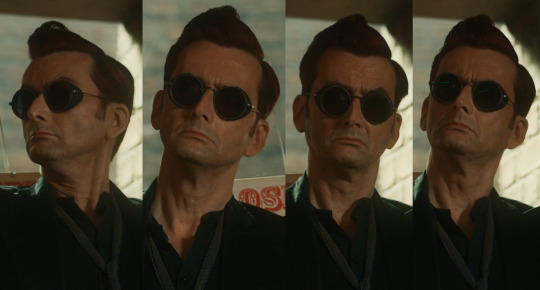
The sideburns have lengthened. They are longer than before Crowley entered the larger threshold and shorter than their longest-length that is reached when Crowley is around Gabriel.
Reason being, Crowley is performing the Single of The Bigger Thresholds Trick. He is tricking this threshold.
As an audience player, my understanding from personal experience goes that I'm supposed to come up with a simple solution for what the trick is.
Finding the answer wasn't easy when I found it, but it is easy compared to so much else that came later since it's from an earlier part of my play.
You may already know the answer if you've read my main Sideburns Scheme post.
The answer is...Crowley never let go of the door. I'll go over the mechanics of that more in-depth with the Earthly Objects section.
...
Brighter Red Streak Check

The more saturated red streak of hair is harder to find because the music shop itself is so dark. Still, if one takes the time to look more closely, it can be found. I have brightened the image above to help find that streak.
...
Hairstyle Changes

The sideburns are longer. Given the lighting, the hair is darker. Instead of a wild set of curls, the top hair is more collected with a swoop up and to Crowley's right.
It looks similar to before Crowley went on his drive, but Aziraphale's got his clipboard and pen to help assure us that this scene takes place after the drive and following the preceding scene that had the shorter sideburns.
...
Earthly Objects
(For reference: Earthly Objects | The Ball Invitations Checklist | The Pocket Trick Touch #3 - Double - Between Door Frames and Papers | The Bigger Thresholds Trick Visual Representation)
Let's start with acknowledging the three significant things that are happening here: Mr. Arnold's ball invitation, the Single of the Bigger Thresholds Trick, and the Double of The Pocket Trick. Rule of Three!
Once Crowley has closed the door and put his thumbs in his pockets, there are three types of cuts with his face in them. One type is the one that shows his legs and pocket touches for the Double of The Pocket Trick. Another type is the one that shows Crowley closer to the hinges of the actual door and with his right shoulder touching the sign on the window. This type is for where the knot of his tie is visible and upward so includes his upper chest. Another type is only ever actually shown once, and it's where Crowley is closer to the side of the door with the doorknob, showing his upper chest, but this time, the knot of his tie is not visible.
...
The Bigger Thresholds Trick: Single
Of the three, I'll cover this scene being the Single of The Bigger Thresholds Trick first.
The preceding scene showed us that the threshold starts with a hole in the wall and eventually leads to the door to this music shop. Just outside the door, there is a little extra roof and a little extra wall.
The door is like the end of the threshold.
Aziraphale opens the door for Crowley, using the doorknob. Crowley enters and is not shown with an actual touch to the doorknob. His left arm is visually in front of it briefly, but there's no hand seen using it as a doorknob.
Instead, as the scene progresses, Crowley places his left hand on the door. The left hand has the index finger touching the door panel, then the other three fingers touching the edges of frames on the door. Edges are thresholds in Earthly Objects.
...
Visibility and Invisibility
If you've read my posts at length and closely, this part is new and difficult to explain.
In theory, heavy duty theory here, Crowley wants to be visible to Mr. Arnold but invisible to the threshold, specifically the door, he is tricking.
By that, I mean, he wants this touch on the door for the Single of The Bigger Thresholds Trick to be for the door and not the window pane. A window pane is an earthly object. He can touch the sign because if the window pane is effectively neutralized, it's more like the sign is just hovering in the air and still touchable.
Of the three types of cuts described further up, the one showing the knot of Crowley's tie and upper chest area with his right shoulder touching the sign is the type mainly designated for this Single in The Bigger Thresholds Trick.
That touch to the white rectangular sign with red letters is for this Single of The Bigger Thresholds Trick. Meaning, it is not for the ball invitation. Mr. Arnold's dialogue about apostrophes on signs in windows and Crowley shifting his movement while touching that sign is a clue for that touch being relevant to this part of this Threshold Trick.
The sign is the visual marker that this touch is the Single because it is one sign. It's not a door. It's not a window. It's not a doorknob. It is specific to this threshold and singular.
How is the window pane being neutralized?
The double pocket touch on the door is allowing it through those two little sleeve pockets Crowley is making with his left arm. One such pocket handles the visibility for Mr. Arnold. The other such pocket handles the invisibility for the door.
That's my guess anyway.
As for how I'm making such an outlandish guess, a big part of it stems from what happens later with the Triple of The Bigger Thresholds Trick, where I do think Crowley is invisible to the angels in the elevator with him.
Another part if it then comes from my thinking maybe Aziraphale was checking to see if Crowley is invisible here because of that idea with the elevator. Then, I took some time to decide, no, Aziraphale is checking for the long sideburns and wants to be sure that Crowley is still visible for Mr. Arnold.
Otherwise, the idea is from pocket mechanics being so absurd, difficult, and generally imaginative.
We've already covered my saying there was an invisible border between the bookshop and the car, so something being invisible is not a new concept. Neutralizing a window pane is not a new concept either since it was done in The Perfect Entrance Trick. Pockets being absurd and confusing while requiring imaginative play is yet another established concept by this point through The Pocket Trick being active.
A mild confirmation the game gives to Crowley being invisible to the door is that no matter how closely I look at Crowley against the window pane, I can't see his reflection in that window pane, even when he moves.
...
Checking


In my earlier play of this game, before I thought the broader Earthly Objects game existed, I noted that Aziraphale is checking that the longer sideburns are there. He looks at Crowley twice to see that they are there.

He is checking to such an extent, that no other location gets a mark on the paper, just this one.
This type of thing is also what I mean when I've said that there's some not fully deciphered hidden message, in my play, from The Pocket Trick that goes something like, if you get as far in the game to find The Pocket Trick, you've been using your imagination with word play (thinking outside the pocket) all along.
Because that's what I was doing with this idea back then, and that's before even finding and naming the Earthly Objects game.
My notes back then also remarked that this entire setup then suggests Crowley meant for this outcome or to learn it.
For my own play, this part is the strongest clue that yes, Aziraphale knows the sideburns change.
With the pub, the sideburns being long looks more like something that just happens, without extensive play and study of the games. With the music shop, the sideburns changing from short to long to short again looks far more deliberate from both Crowley and Aziraphale because of Aziraphale checking. He checks figuratively with his looks and literally with that mark onto the paper.
...
Memory Commonality
Before figuring out the silly games further, this space has something notably in common with another human space Crowley entered and showed long sideburns, which was the pub. Both scenes have an encounter with a human who was at a meeting some years ago and says as much to Aziraphale. Both humans mention lights.
In the Double for The Bigger Thresholds Trick, Mr. Brown brings up a Whickber Street Traders and Shopkeepers Association meeting from "several" years ago. He didn't bring up lights as part of the meeting but as an item to discuss with the upcoming meeting. The lights were specified as "winter street lights."
Here in the Single, Mr. Arnold brings up a meeting from "ten" years ago and specifies the discussion included "Christmas lights."
Mr. Brown's memory is suspect for a number of reasons covered in the post about the pub visit.
Mr. Arnold's memory is not as suspect.
But...he just coincidentally brings up such a similar memory in such a similar context of Crowley maintaining longer sideburns? While in a presumed human space unless one considers threshold size, two-lane management, and maintaining touch on the door? I have no explanation. What good does having that memory recalled in front of Crowley do?
...
Contrasts
For the pub and the music shop, these encounters both have significant contrasts to each other.
Mr. Brown is met in a very busy pub with a lot of humans around. It's much bigger than the music shop.
Mr. Arnold is met alone in his music shop, which is quite small in comparison to the pub.
...
Back
While I've noted the three types of cuts once Crowley is situated, the scene still ensures that even on the cuts showing the pocket touches for The Pocket Trick and that one cut that doesn't show the knot of his tie, presumably relevant to the ball invitation, his back maintains its touch onto that door for the duration of the scene. He switches which side of his neck is touching the sign in some cuts, but he's also always touching the sign.
...
The camera never sees how or what of Crowley's touch changed from when his left hand was on the door to when he he has his back on it and touches his pants pockets.
Given that, as stated earlier, so far as the game and the threshold is concerned, Crowley "never let go of the door."
...
The Pocket Trick: Double
I recently made a new post to cover this touch more in-depth: The Pocket Trick Touch #3 - Double - Between Door Frames and Papers.
I'll still talk about the touch here but not as thoroughly.
With two pockets in use, there are two Pocket Frames. One is Papers, and the other is Door Frames.
Here is my newest best guess for the Touch Point:
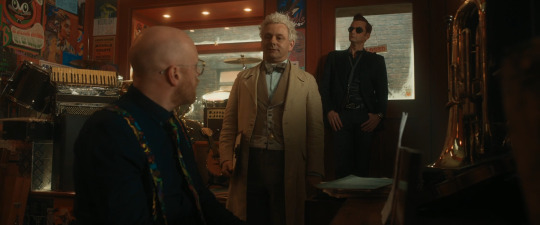
...
Findable Rainbows

With two pockets being used and thumbs inside the pockets instead of outside, two rainbows can be found when Crowley is not on screen.
...
Rainbow Connection
The Rainbow Connection starts on Blue, switches to Purple, then switches back up to Blue since the connection goes down, then up.
...
Reflective Surface
There is a prominently displayed brass instrument to Crowley's left that seems to be acting as a substitute Overhead Light while he is touching a door and on the side of the door that is indoors where this reflective object is.
Aziraphale has a drum cymbal with a reflective surface that's above and to the right of his ear, that is probably acting as his Overhead Light too. He is Crowley's assistant during this touch.
There's probably some better wording to be found, but in essence, Aziraphale and Crowley are instrumental to each other here.
...
Actual Hands

Left hand: With Crowley's left hand, the left thumb, with its MCP thumb joint, is visibly touching the edge of the jacket from the start. As the left thumb goes in, the index finger actually obscures it temporarily in the process. The index finger is the one that touched the door panel, the area specifically regarded by this story as a threshold part of the door. Once the thumb is partly visible again, the CMC thumb joint is touching the edge of the jacket. Otherwise, the fingers are placing themselves on the front of the pocket, which is its threshold. The thumb, index finger, and pinky finger were more extended than the middle and ring fingers going on. That's something else I would love to know what the logic is. My current best guess is that helps distinguish which fingers made a touch for The Bigger Thresholds Trick and which ones made a touch for The Pocket Trick. My theory is the index finger and pinky would be for The Bigger Thresholds Trick. Then the middle and ring fingers would be for The Pocket Trick.
Right hand: For the right hand, the right thumb is hidden as it goes into the right pants pocket. The right hand fingers are placing themselves on the front of the pocket though the pinky tip is not as clear as the others due to the lighting and position. That is probably intentional and excludes that tip from counting as part of the touch. That ends up with 7 digits total on the thresholds instead of 8.
...
Human Assistance
I don't know what purpose it might serve, but there is a human passing by behind the door when Crowley closes it.
Two humans contribute to the Rainbow Connection Reflections (probably) and the switch from Purple to Blue.
Mr. Arnold is kept out of the Pocket Frames. He also ensures that when Crowley's double pocket touch is on screen, so is a human.
...
Mr. Arnold's Ball Invitation
Let's check in with the checklist.
Aziraphale does all the talking during this ball invitation done in English.
Aziraphale does not talk to Crowley.
Aziraphale looks at Crowley at least once. In fact, it's twice.
Aziraphale's illusionary touches over Crowley include the bottom of his clipboard and with his left arm. Since the left arm is used for The Pocket Trick's double, the illusionary touch with the clipboard is likely meant for the ball invitation. Aziraphale's left coat pocket also has an illusionary touch on Crowley.
The invitation does not start with a hello, question, or number.
There is a question stated that is nullified by answering it.
Numbers used are years.
Names used do not include anyone who will be at the ball.
The points Aziraphale earns are dependent on his earthly object touches.
...
Crowley does not talk to anyone, including Aziraphale.
Crowley looks at Aziraphale at least once. In fact, it's twice.
The first look is when Aziraphale looks at Crowley to start the offer on the book. Crowley looks back in response. The second look is near the end of the scene in response to Aziraphale giving away that book.
If I'm wrong about the window pane with The Bigger Thresholds Trick, the window pane itself is the most obvious earthly object touch. Given the structure of the scenes and that one cut that does not show the knot of Crowley's tie, I think the earthly object touch is actually the string for the sign that Crowley is touching with the back of his head. And if I'm wrong about that, then my next guess is the little plastic thing attaching the sign to the window.
For the self-touches, I can't figure out if they have corresponding earthly object touches. They might be exempt because we sort of have 3 doors (thresholds) here with the door of the music shop, and then each pants pocket acting as a little magical, imaginary door. The touches themselves require pocket imagination powers.
Among the things done before these touches happen is that one of the tassel tips touches Crowley's Belt Head as he closes the door. The tassel tips are thumb tips of the Tied Hands.
In any case...
The self-skin-contact touch would be the thumbs of the Tied Hands being allowed in place of Crowley's actual thumbs. The tassels of the tie are visibly crossed and touching each other. They represent the thumbs touching each other.
There are plenty of self-clothing touches, however, anything with the jacket is probably for The Pocket Trick. The fingers on the front pants pockets are also for The Pocket Trick. So, my guess then is that Crowley's left vest tip on a belt loop, with both touching the snake belt, is the self-clothing touch for the ball invitation. Who knows what the right shirt sleeve being out is doing? Not me. It could be contributing or even allowing this touch, but my play isn't good enough to figure that one out.
The self-mouth-touch is...well, I like to think of it as the Belt Head nibbling at Crowley's right vest tip in front of it, but you can imagine it as you please. Crowley's actual mouth stays closed while he's in the music shop, but the lighting looks like it is giving the snake belt eyes. So, thinking outside the pocket, using imagination and word play, that's what leads to the eventual imagined self-mouth-touch with the Belt Head. And generally, for me, this scene with this idea is the biggest clue that the Belt Head is the Belt Head.
Pockets are in use with the two actual thumbs in the pockets and the sleeve pockets made with the left arm. If the game's being picky and wanting still yet another imaginary pocket for the ball invitation, then that would be the pocket formed between Crowley's legs, most obviously displayed in the cut where he is closing the door.
The cross is, I think, the thumbs (tassels) of the Tied Hands crossing each other.
Crowley's shadow extends to his right and onto the door frame of the music shop.


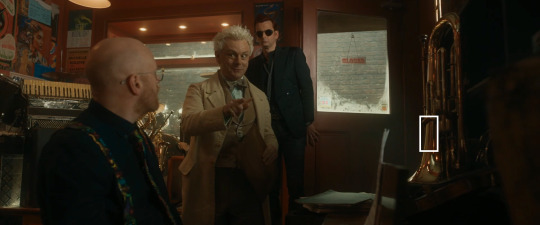

A reflection of Crowley is almost impossible to find, but I have figured out two likely places where it appears. I have to assume the reflection is him since it's not big or prominent enough or including a face or any such thing.
When Aziraphale enters with Crowley not far behind, Crowley's reflection is probably in the wooden surface of the piano. If you want to try playing this part too, you have to figure out that Aziraphale's reflection is there so the darker parts that follow him are probably Crowley.
When Crowley is closing the door, some movement is understood to be happening in the large brass instrument displayed to the camera's right, so he's probably somewhere in there too. It helps to look at the lights reflected into its lower part.
Light is reflected in Crowley's sunglasses in various moments. The lights are usually a greenish line into each lens when they do appear. They are most obvious near the end of the scene when Crowley gives Aziraphale a look at the realization Aziraphale is going to give away a book.
...
Mr. Arnold himself crosses his arms, so that probably counts for something.
...
Aziraphale and Crowley do not talk to each other.
Aziraphale looks at Crowley just before offering the book and again when talking about problems at the BBC.
Crowley looks at Aziraphale when Aziraphale's starting his offer on the book and again after Aziraphale says he would let Mr. Arnold have the book.
Almost the entire scene is with Aziraphale on the camera's left and Crowley on the camera's right. That's the "correct" sides view. For a "wrong" sides view, Crowley is briefly the one of them further to the camera's left when Aziraphale starts to open the door. It's a limited look at Crowley's already longer right sideburn when that happens. This brief moment also has Crowley to Aziraphale's right, instead of Aziraphale's left.
...
Each ball invitation has a findable match to a Threshold Trick. While two Threshold Tricks are happening in this scene, neither is the findable match specifically for the ball invitation. This one's match is The Window Trick. The clue is in the dialogue, Crowley touching the window, and the mechanics in use making sure that he is still visible to Mr. Arnold for Mr. Arnold's ball invitation.
...
Story Commentary
I have a million questions on how season 3 is going to handle these ridiculous games, and one of those questions is if it's going to explain the significance of season 2 having two Threshold Tricks happen in the same scene.
I mean, I know as someone who plays the games, the answer is, on some level, the set of clues to play the games. This part is what led to my figuring out the Belt Head is the Belt Head, for example. But still...anything more to it than that?
Oh, also that format gives the scene a potential Rule of Three met with the two Complex Threshold Trick touches happening here. There is a Single and a Double, or 1 + 2, and 1 + 2 = 3.
Aziraphale is assisting for both Threshold Tricks at the same time.
...
This scene has a "meta" moment. I wouldn't go so far as to call it a Metatron edit, but it was an amusing thought early in my play.
Here's how it goes:
Oh, shoot, Mr. Arnold doesn't want to go to the meeting. I/we [whoever is writing this story] need to get him there. He has to be there. How do we get Mr. Arnold to the meeting? Look at Crowley. Crowley's played by David Tennant. David Tennant is famous for playing the Doctor in Doctor Who. Yes. Doctor Who. Now we've got it. We'll have Aziraphale offer a book related to Doctor Who. Problem solved. Whew.
...
I've noticed the temptation and Aziraphale's smile, but I leave the discussion of such things to others in other posts.
While Aziraphale and Crowley are avoiding actually ordering the humans into the bookshop, they aren't really asking either. Whatever it takes to get the invited human to the ball? It's going to be done.
That suggests this ball has to happen. Yeah, sure, theoretically, it's to keep the invited humans safe, but not everyone on the street is invited. There are the humans who just pass by on a regular basis. So, there's an implication with the Street Traders and the Shopkeepers that they have to be at the ball. I don't know why, just noting the observation.
...
That's it for this post. Sometimes I edit my posts, FYI.
...
Main post:
The Sideburns Scheme
#crowley#david tennant#good omens 2#good omens#good omens s2#good omens season 2#good omens meta#good omens analysis#good omens crowley#crowley good omens#good omens clues#good omens theory#good omens theories#crowley sideburns
30 notes
·
View notes
Note
Considering the series, what you would change do make the series better? You can do anything, except changing the powers, like you doing.
A very interesting game, but quite vague, even with the restriction of not being able to change powers, so here are my rules:
I can't use any reference media than canon;
I can't advance (future season eps in early seasons) events, only delay (early season eps in future seasons). Remembering that if it's something that would have happened if another character had caused it before canon, I can anticipate it, like if the character is smarter or more defiant, it would already count;
If I change miraculous, I can only do it with characters who have already been ported in the series, and I can only use characters available in each season.
Let's start the fun:
Starting with the main change, the delay in the villain's appearance, Master Fu discovered that the butterfly miraculous was for evil and went after the carriers, the same scheme, but he didn't deliver the miraculous right away, because Wayzz said that Nooroo's energy was too weak to say that it would be active so soon.
Meanwhile, Nathalie planned to betray Gabriel because she thought Adrien deserved his father's attention more than getting his mother back, but her goal was still to get Emilie back because she was in love with Gabriel; during this week without a villain, Nathalie would have resigned, forcing Gabriel to look for another secretary, and in the meantime she would have devised a plan to steal the Wonderful and the Wondrous Book, and so in the middle of the night, by switching off the cameras to make it look like a blackout, she stole the book, the peacock and the butterfly, leaving a copy for everyone.
As Master Fu had a week to find his bearers, he ended up finding three ideal bearers: Kim, Max and Alix, and knowing the villain's delay, he decided to give them the strongest miraculous ones to get used to, being Ladybug (more because it was obligatory), Rooster and Dragon, leaving them in their backpacks. However, as Kim is forgetful, he ended up losing the dragon's jewel without realizing it, and Chloe ended up finding it.
With this we would have Bettlix, Phoenix and Royal Scales, in the first week, Max would be the most excited of the three, because he wanted to discover the limit of his powers, Alix would be indifferent, because he hasn't met his colleagues yet and the villain hasn't even appeared, Chloe would only want fame and attention, but wouldn't tell anyone.
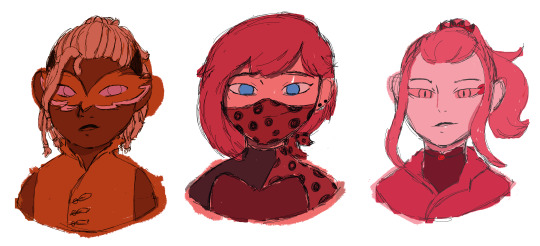
Simple sketch to show them, I tried to follow the canon rules on designs, and I used a single color and didn't make a whole lineart, because it was just an idea and more practical. Even though Chloe isn't wearing a mask, her identity is protected by magic, her hair is red, and her eyes are brown (so even if she wanted to, it would be difficult to find out).
That's it for now, if you want to know more you can ask, I doubt this will become an AU, at least illustrated, since it's my plan for the DE.
6 notes
·
View notes